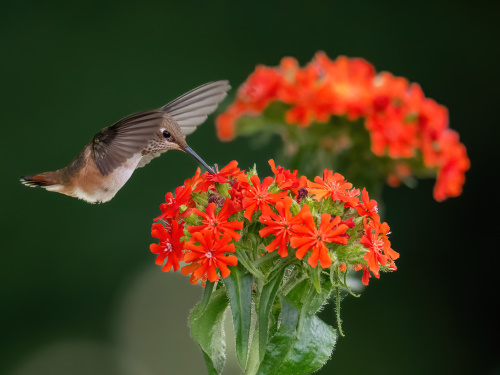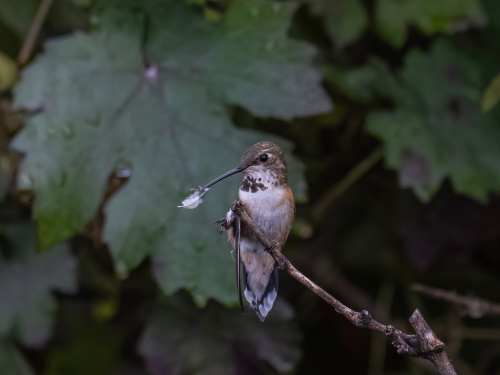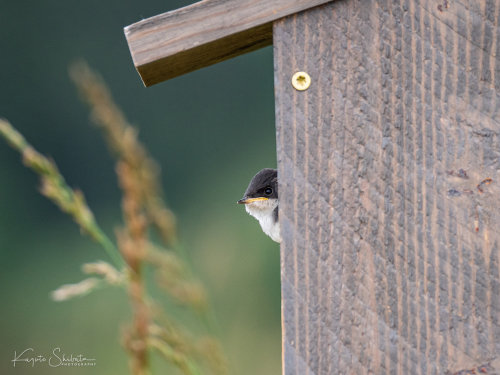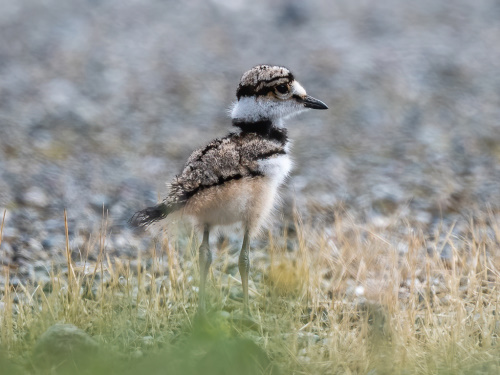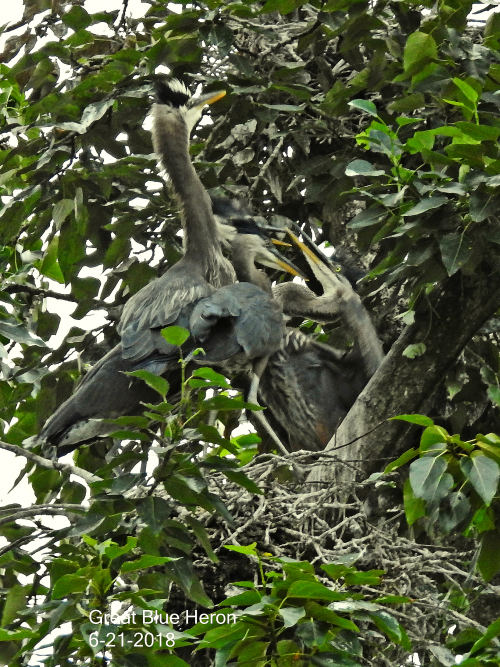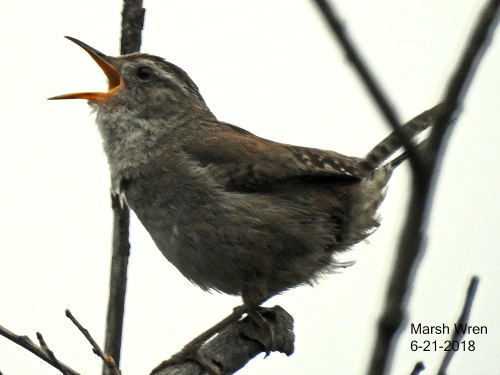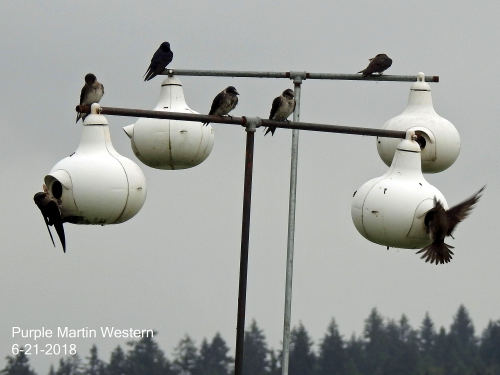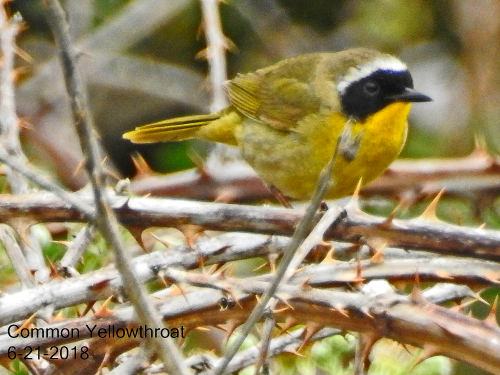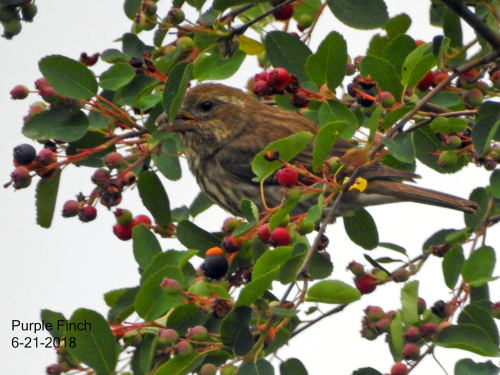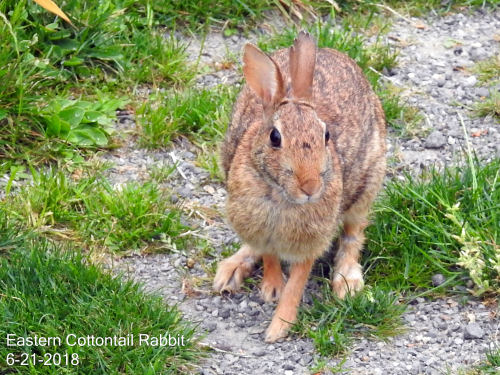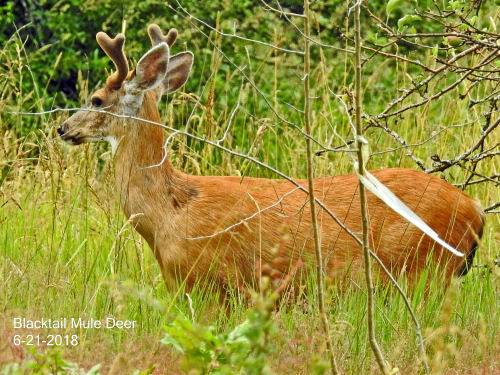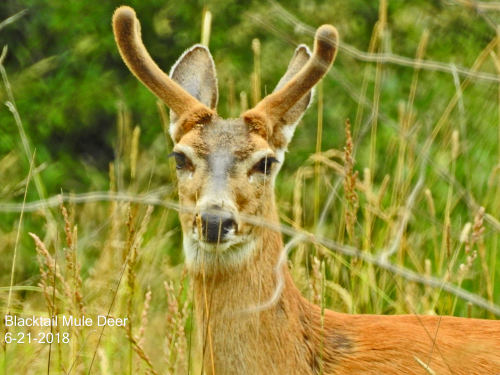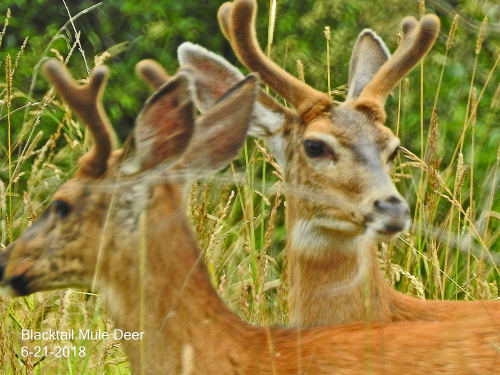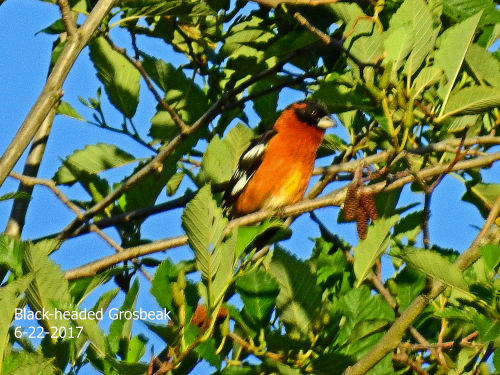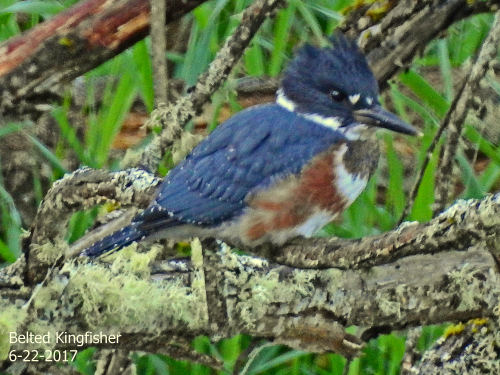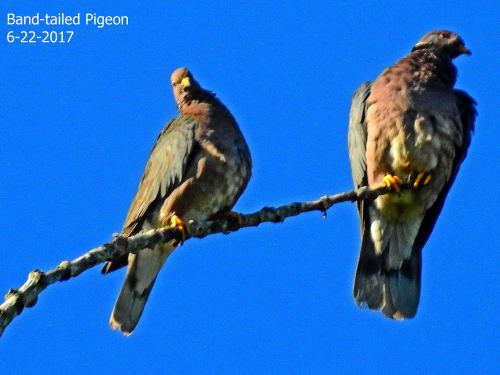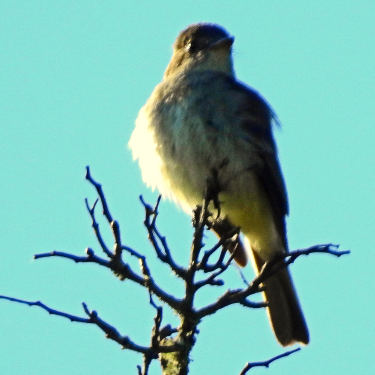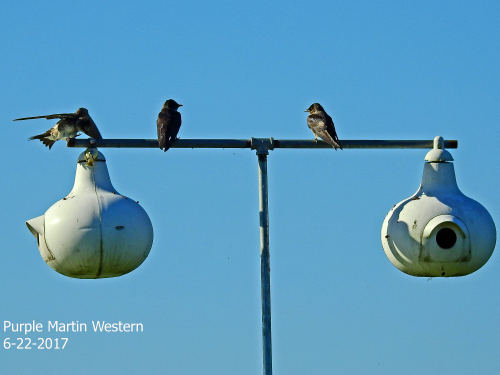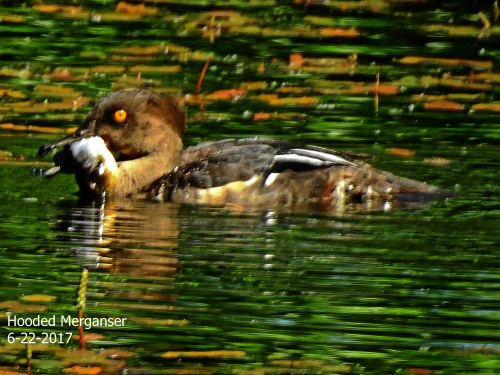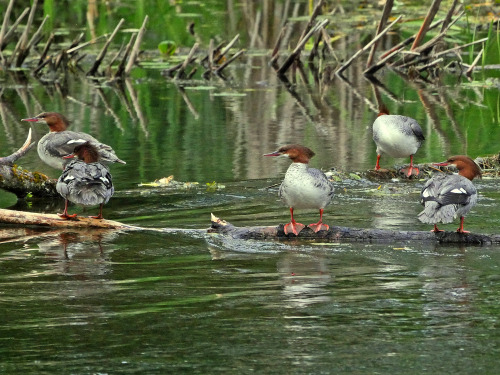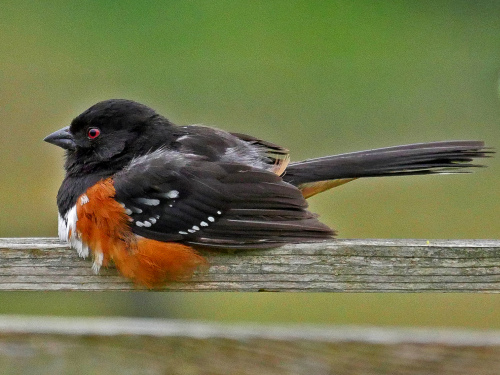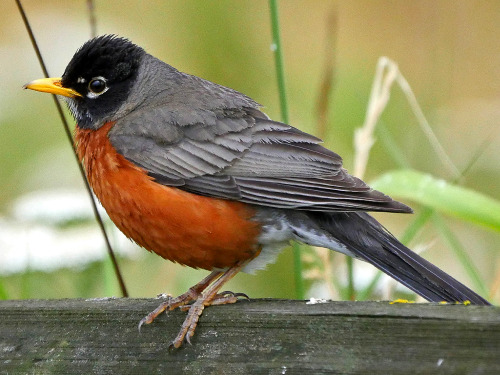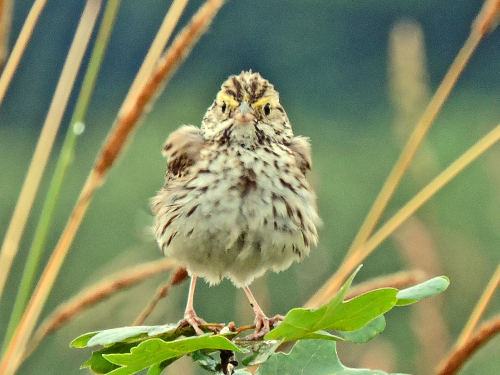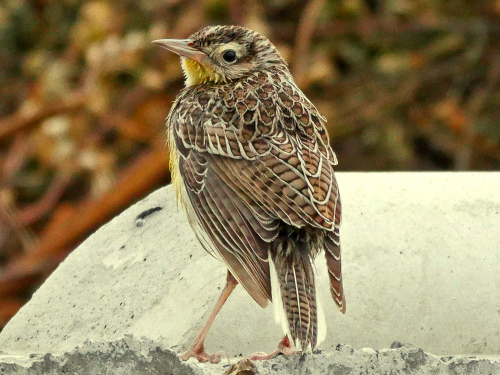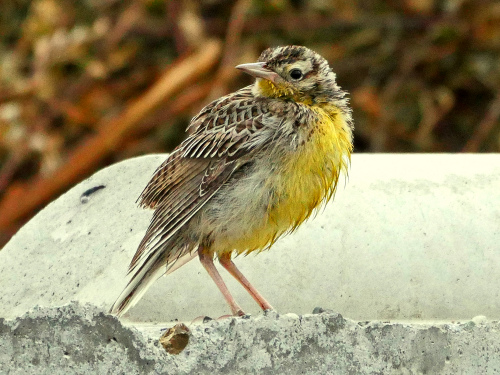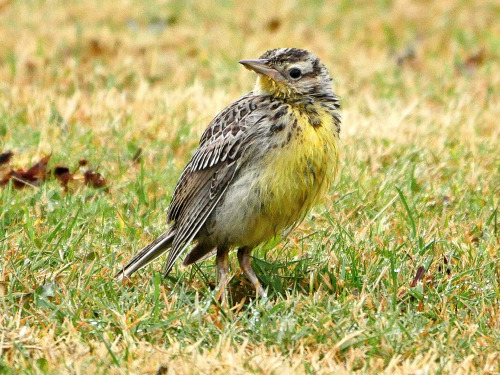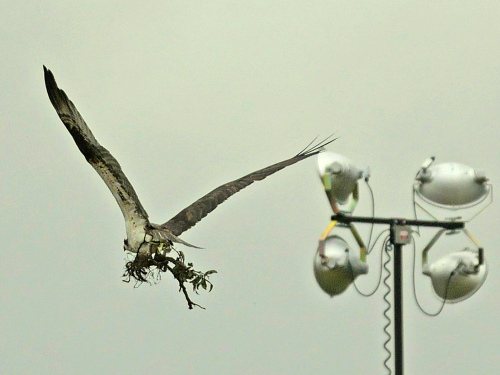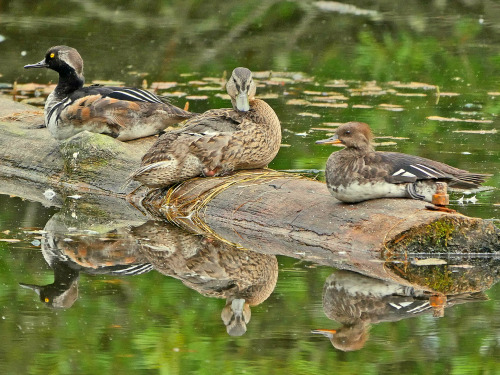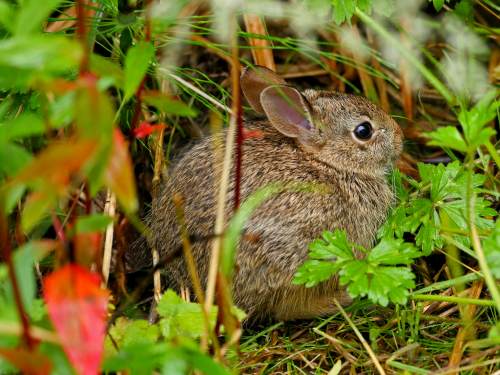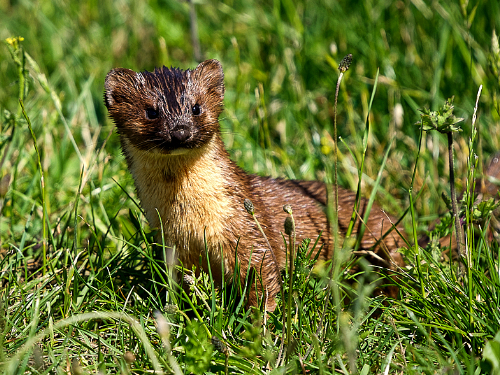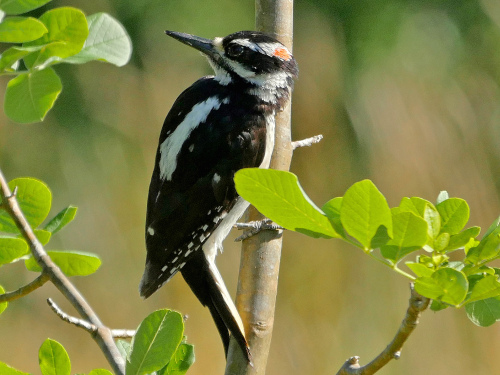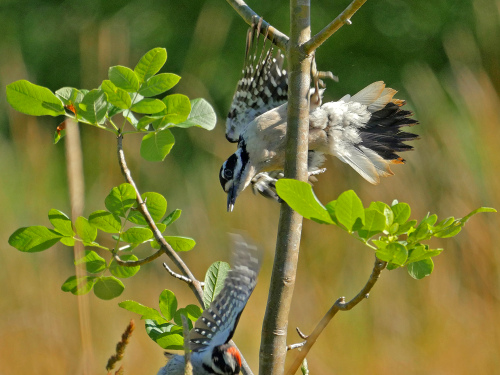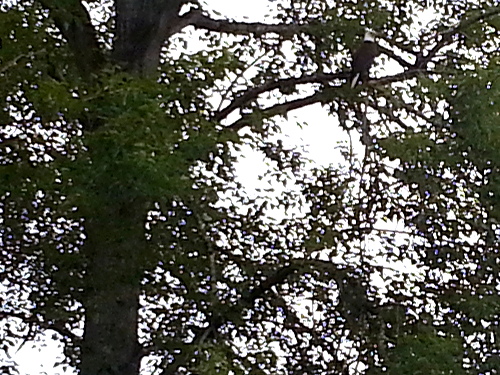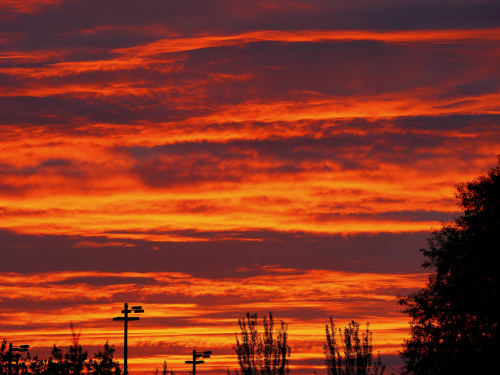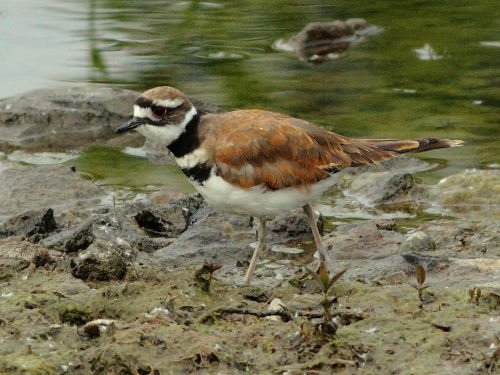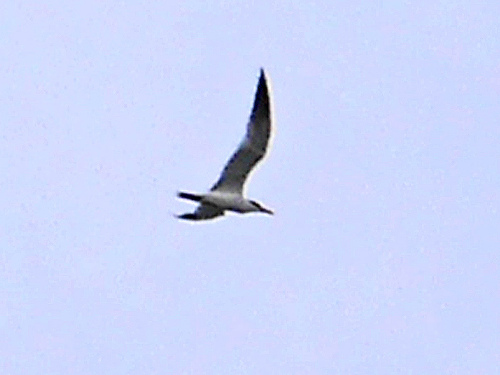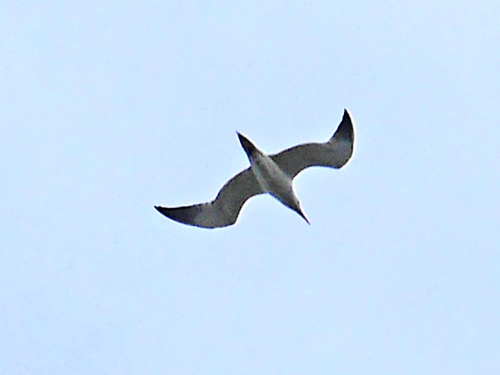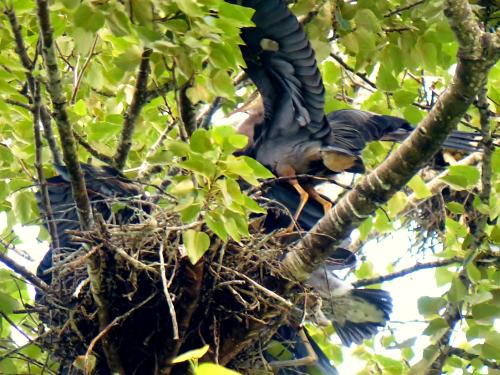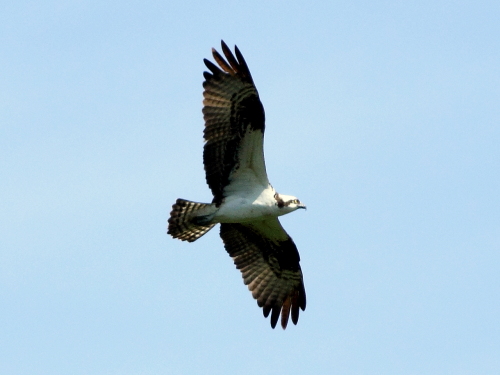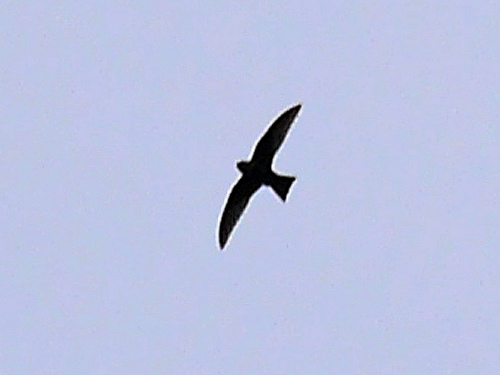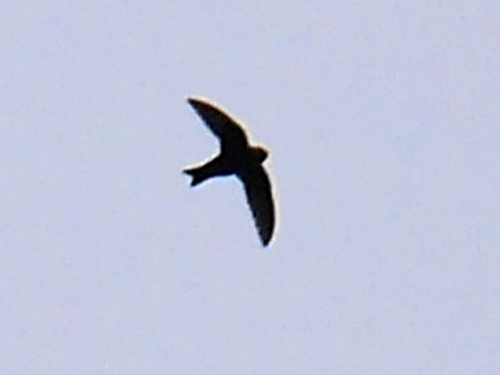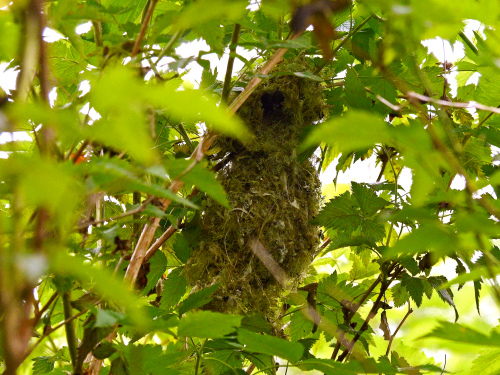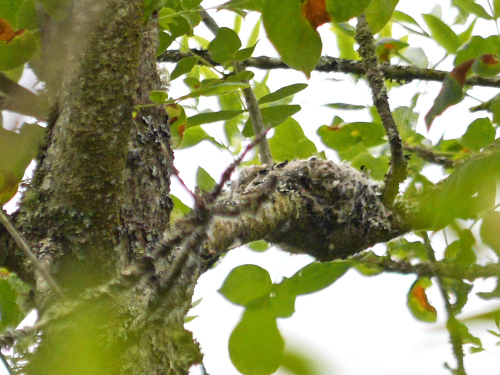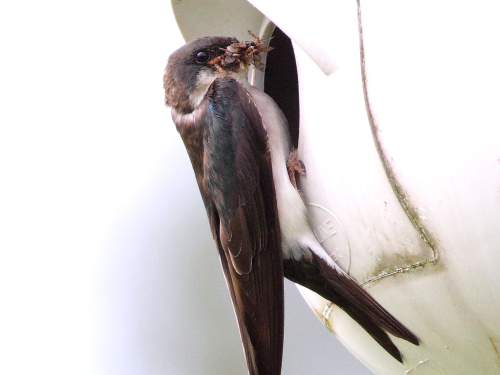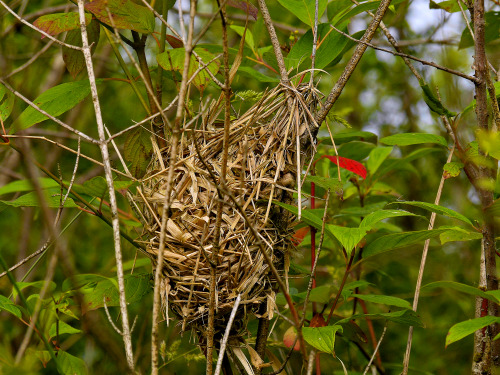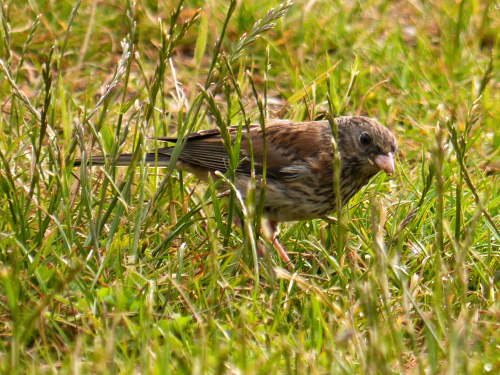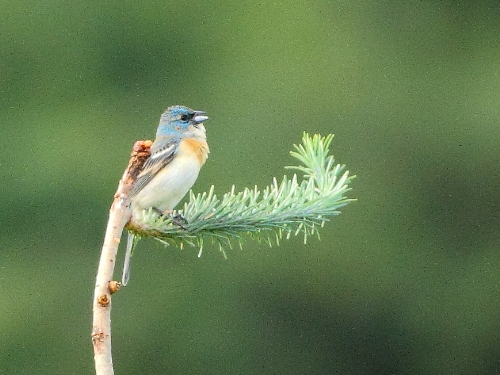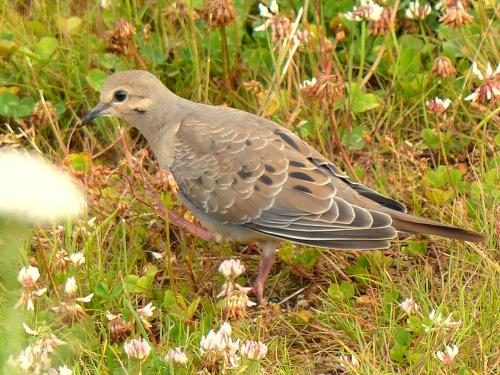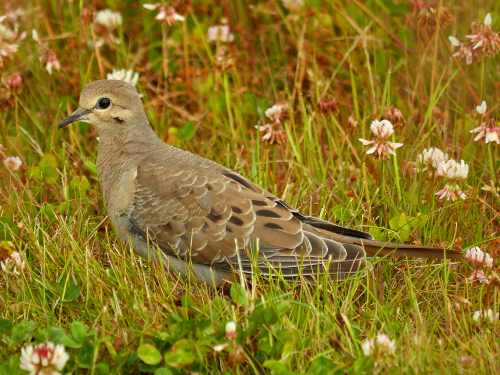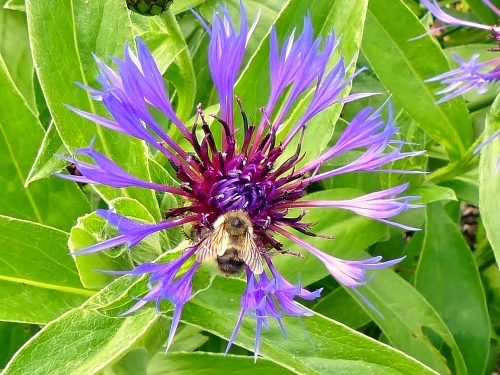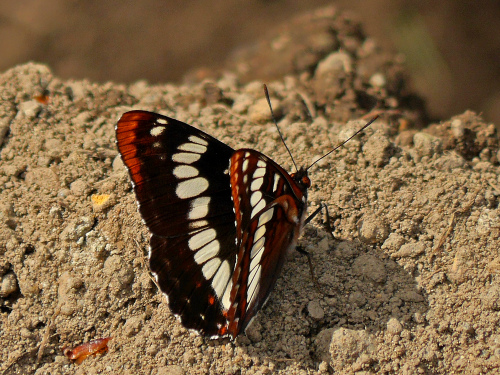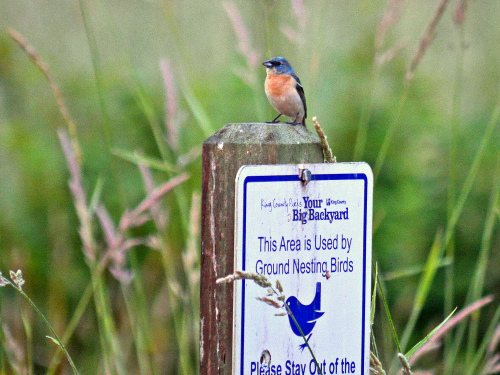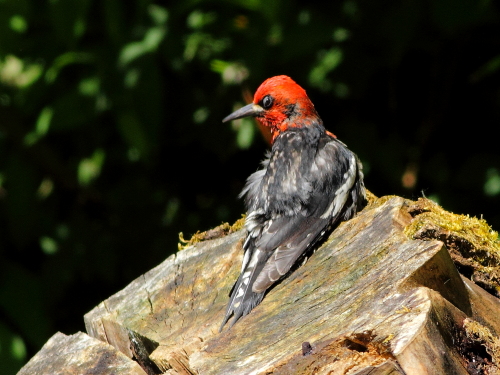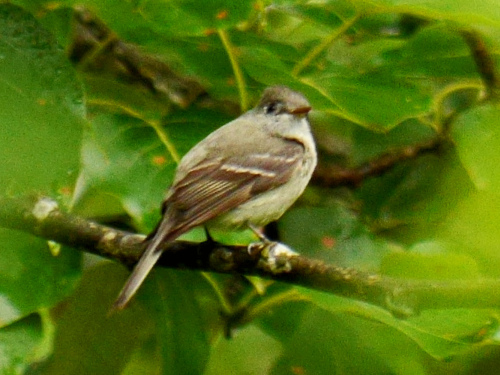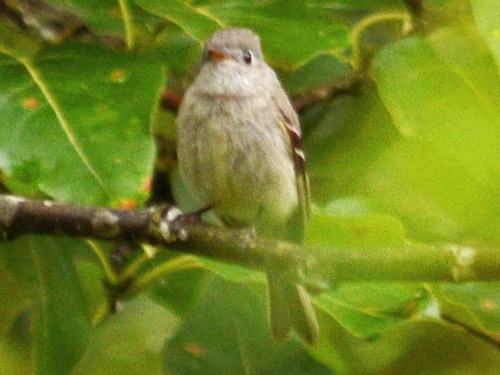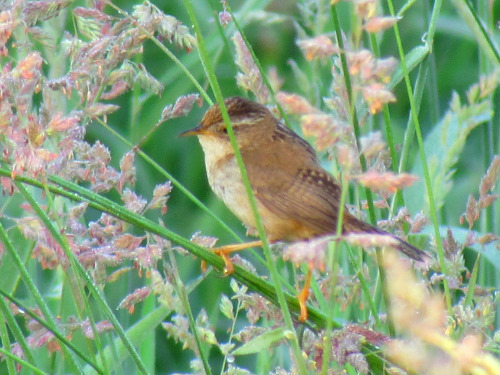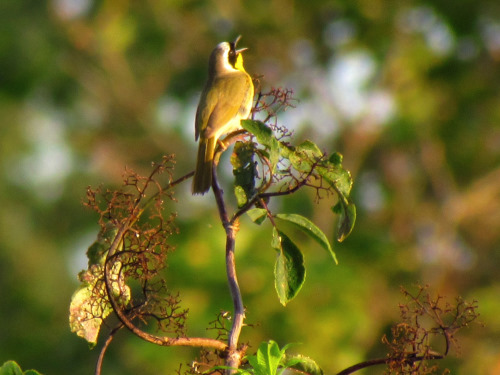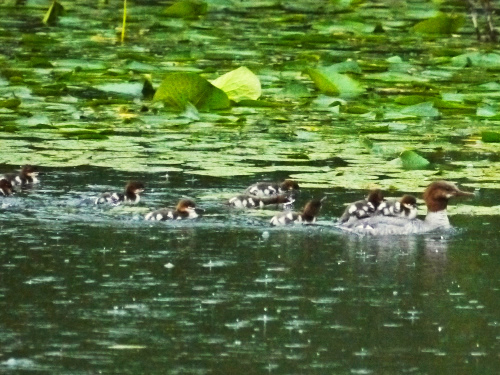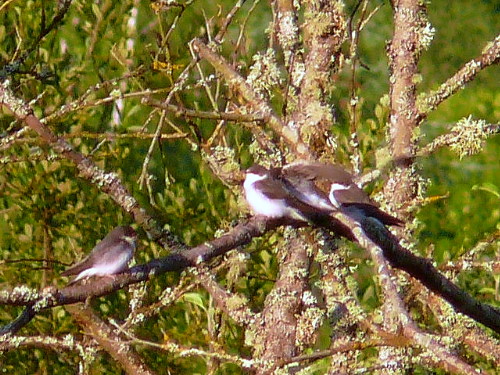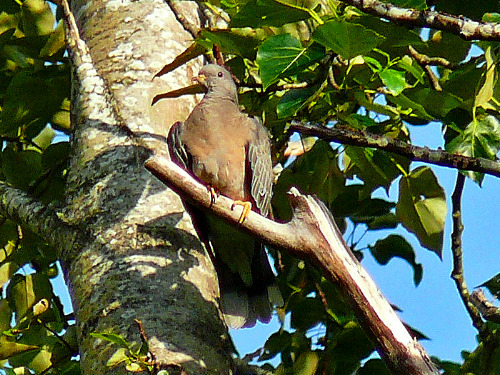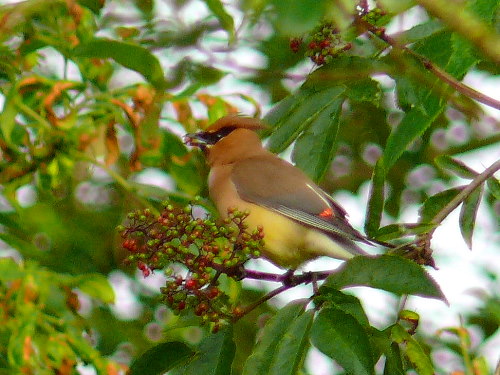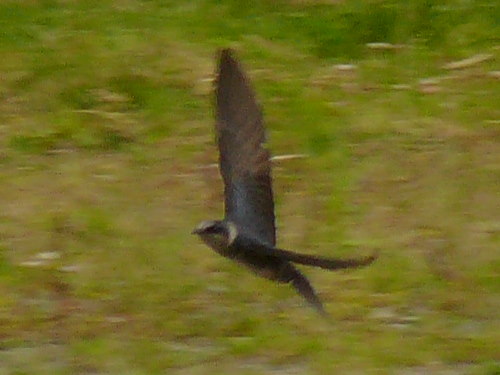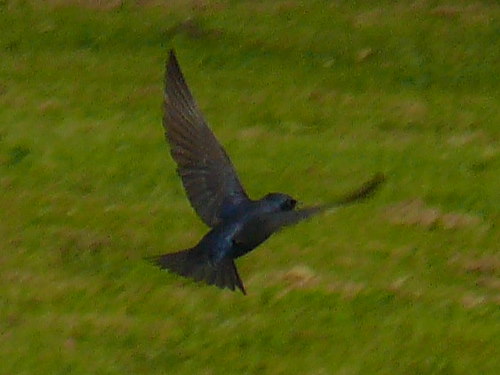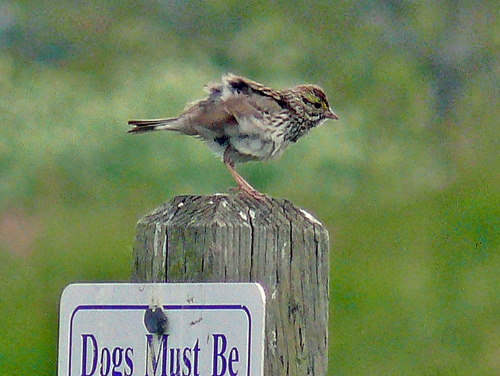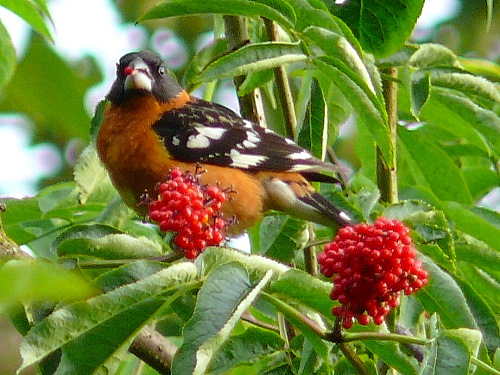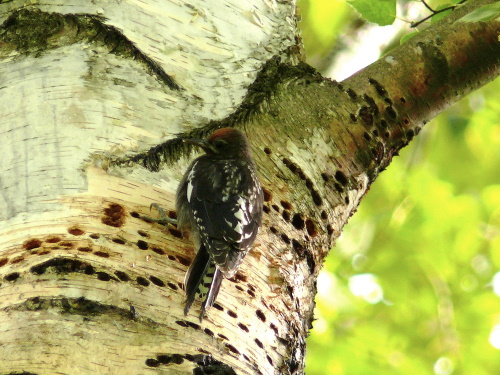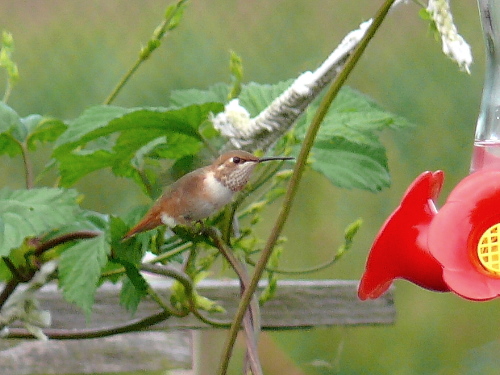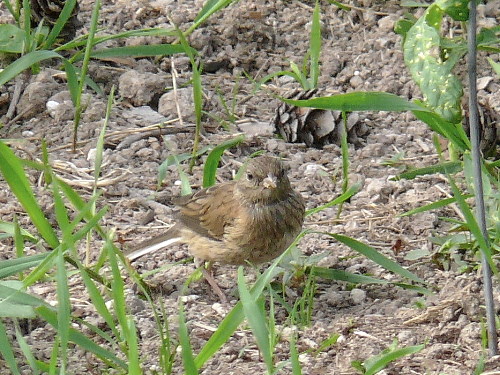Prev |
Bird Sightings Week 25
|
Next |
Rarities for Week 25:
| Whimbrel | 19-Jun-10 | 10 birds on grass soccer fields. Reported by John Farley and another birder |
| American White Pelican |
22-Jun-20 | Four, flyby, eBird by Jerry Romano |
| ...Least Flycatcher | 18-Jun-10 | On territory near Dog Central, 17-Jun through 15-Jul |
| ...Northern House Wren | 10-Jun-21 | Bird remained 03-Jun to at least 01-Jul |
| ...Yellow-breasted Chat |
20-Jun-24 | Continuing from 13-Jun |
| Blue Grosbeak |
19-Jun-22 | Male, East Meadow |
| ...Indigo Bunting |
18-Jun-20 | Singing male, Dog Meadow. remained 11-Jun to at least 16-Jul |
Report for June 19, 2025 Birding at Marymoor
| We had a wonderful morning at Marymoor, with just about perfect conditions: mostly sunny, mostly windless, comfortable temperatures. Lots of singing, and lots and lots of evidence of nesting and nesting success. Our group was the largest in a long time, boosted by out-of-town visitors and people who got Juneteenth off from work. Highlights:
Oh, we also had a plethora of Eastern Cottontails. Missing species included Hooded and Common Mergansers, Caspian Tern, Red-eyed Vireo, Cliff Swallow, Bullock's Oriole, and Lazuli Bunting. The merganser, vireo, and Cliff Swallow used to nest every year in the park, but no longer. For the day, 55 species. = Michael Hobbs |
Report for June 20, 2024 Birding at Marymoor
| We had a very nice Summer Solstice survey today, with good weather. Few surprises, and no sign of the Lark Sparrow that was reported yesterday. Highlights:
For the day, 60 species. For the year, 127 species for the survey. = Michael Hobbs |
|
|
|
|
|
|
|
Report for June 22, 2023 Birding at Marymoor
| Our first survey after the solstice was cold and cloudy for the first several hours. It did warm from 47 to 60 degrees though, so we weren't cold for more than the first two hours. Not a bad day. Highlights:
When we were at the Lake Platform, three RIVER OTTER appeared on the east shore. About 8 tiny MALLARD ducklings quickly scooted away from shore. No mom in sight for several minutes. I think she chickened out when the otters approached and ditched the kids until it was safe! She did eventually rejoin them and everyone went back to normal. Misses today included Common Merganser, Caspian Tern, Belted Kingfisher, Red-eyed Vireo, Cliff Swallow, Bullock's Oriole, and \very surprisingly Lazuli Bunting. For the day, 56 species = Michael Hobbs |
|
|
|
|
|
|
|
Report for June 23, 2022 Birding at Marymoor
| Another nice, sunny day at Marymoor - quite the change after so much Junuary weather thus far.
About 10 of us took part in today’s walk - We’re getting into the summer season for birds - not much new left to move in, lots of young ones and strange calls from young ones.
59 species total [including gull sp]
Highlights:
Baby Wood Duck, Mallard, Great Blue Heron, American Robin, Dark-eyed Junco, probably others.
Anna’s on nest, Warbling Vireo singing from same area as last week at Rowing Club, presumably on same nest, Black-capped Chickadee entering nest hole
Notable misses:
Rock Pigeon, Green Heron, Belted Kingfisher, Golden-crowned Kinglet
Matt Bartels
Seattle, WA
|
Report for June 19, 2022 Birding at Marymoor
| Shamik Ghosh found and photographed this BLUE GROSBEAK in the East Meadow. He quickly got word out, and many birders were able to see this great bird. This would be just the 4th Washington State record for this species, and the 2nd King County record. It is a new species for Marymoor Park. | |
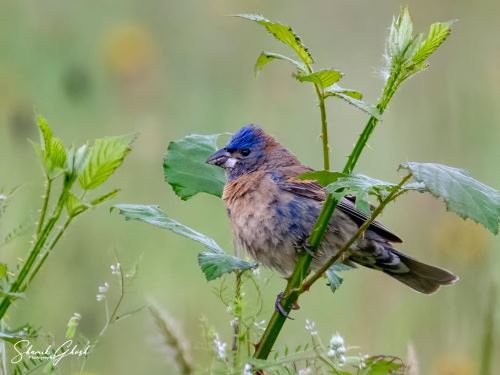 Blue Grosbeak
located and photographed by Shamik Ghosh, 2022-06-19
|
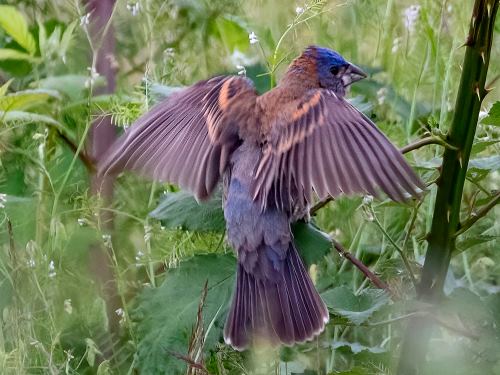 Blue Grosbeak
located and photographed by Shamik Ghosh, 2022-06-19
|
Report for June 24, 2021 Birding at Marymoor
|
It was a delightful sunny day today, with comfortable temps and no wind. We’re into the “summer doldrums” as far as species go, with a low likelihood of unexpected species. But we had quite a few baby birds to admire, and we found pretty much everything that should be there this time of year.
Highlights:
Besides Osprey, Belted Kingfisher, Bushit, and Bullock’s Oriole, other notable sightings of baby birds included Red-breasted Sapsucker, Hairy Woodpecker, White-crowned Sparrow, Common Yellowthroat, and Yellow-rumped Warbler. The Hairy, Yellowthroat, and Yellow-rumped featured babies begging from adult males.
Last week was notable for having SO MANY hummingbirds. Today, numbers were back to normal, with maybe 8 Anna’s and 2-4 Rufous (no adult males noted). It’s likely that some of last week’s bonanza are now dispersing to higher elevations.
Misses today included Hooded Merganser, Rock Pigeon, Green Heron, Red-eyed Vireo, and Cliff Swallow.
For the day, 63 species.
= Michael Hobbs
|
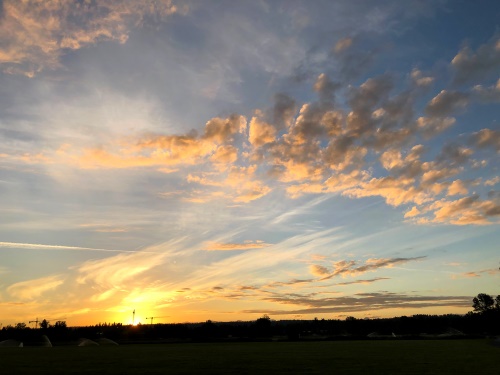 Photo by Karen Snepp 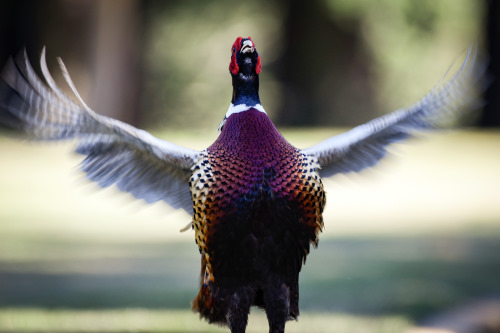 Ring-necked Pheasant. Photo by Michael Shroyer |
Report for June 18, 2020 Birding at Marymoor
|
The weather was gorgeous today for this almost-solstice walk. Pre-dawn had some low-lying fog, but from the Viewing Mound, Mt. Rainier was stunningly clear in the orange light. The moon was a thin waning crescent. To the left, and a little below the moon, Venus was the thinnest of waxing crescents like a mini-me for the moon. Stunning in the scope. Lots of singing today, and lots of baby birds and baby bird sounds.
Highlights:
Misses today included Green Heron and Cliff Swallow. We were disappointed not to see either species of Kingbird, after both were repeatedly seen between our last survey and today’s.
For the day, 68 species.
= Michael Hobbs
|
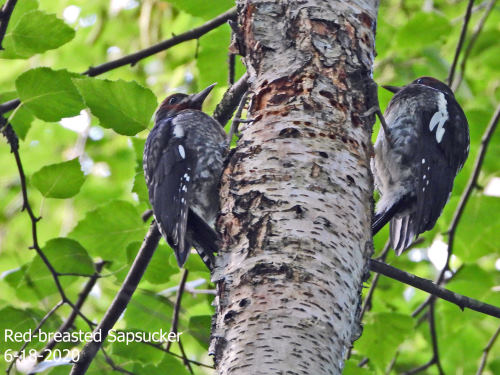 Juvenile Red-breasted Sapsucker. Photo by Bob Asanoma 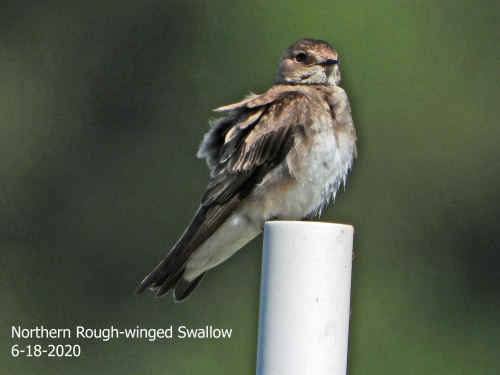 Northern Rough-winged Swallow. Photo by Bob Asanoma |
Report for June 20, 2019 Birding at Marymoor
|
It rained all night, but by 4:00 a.m., or so, the rain stopped and held off all morning. We even had little bits of blue sky showing here and there. The park is abuzz with juvenile birds now. Few surprises this time of year, but still excellent.
Highlights:
As I said, lots of juveniles noted. At a minimum: Mallard, Anna’s Hummingbird, Rufous Hummingbird, Great Blue Heron (all still on the nest), Barn Owl, Western Screech-Owl, Downy Woodpecker, American Crow, Black-capped Chickadee, Chestnut-backed Chickadee, Bushtit, American Robin, House Finch, Savannah Sparrow, Song Sparrow, White-crowned Sparrow, Dark-eyed Junco, Red-winged Blackbird, Common Yellowthroat, and Black-headed Grosbeak.
Eastern Cottontail were also especially numerous, with many young. We also had three or more sightings of American Beaver, and Matt & I saw a VIRGINIA OPOSSUM at about 5:15am near the Compost Piles.
Misses today included Canada Goose, Rock Pigeon, Red-tailed Hawk, Cliff Swallow, and Lazuli Bunting.
For the day, 59 species.
= Michael Hobbs
|
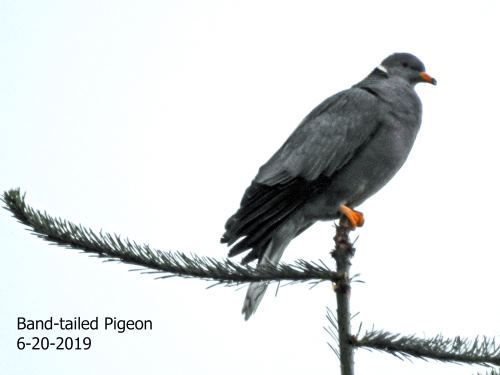 Band-tailed Pigeon. Photo by Bob Asanoma 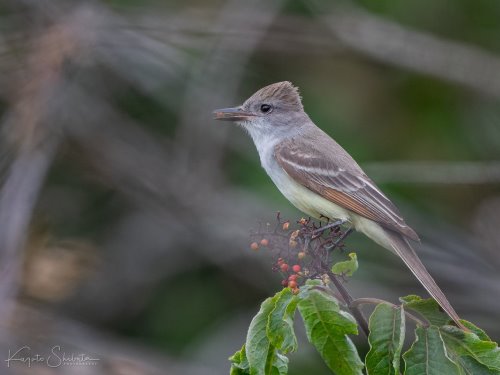 Ash-throated Flycatcher, 2019-06-24. Photo by Kazuto Shibata |
Report for June 21, 2018 Birding at Marymoor
| An unexpected day at Marymoor today. Thankfully, the predicted rain held off, and we only had minor, intermittent sprinkles. There was a fair amount of activity, but no great push of migrants like I’d hoped. We did have several new arrivals, some on the early side, but great views of birds were scarce.
Highlights:
We’ve seen WESTERN WOOD-PEWEE as early as May 4, but May 10 is still the 6th earliest arrival date. The SWAINSON’S THRUSH is on the early side of normal arrival date. And this is the 3rd earliest we’ve ever had LAZULI BUNTING; earlier sightings were 2004-05-05 and 2015-05-07. Conversely, this is definitely our latest spring date for WHITE-THROATED SPARROW. They are never common at Marymoor in spring (less than 40 records total for January-May). We’ve only had three April sightings, and our only previous May date was 1994-05-05. So that’s only 5 sightings later than March 27th. Today’s bird was drab and poorly marked. So, only 60 species for the day, but six new species for the year, to bring our 2018 list to 128. == Michael Hobbs |
|
|
|
|
|
|
|
|
|
|
|
|
|
Report for June 22, 2017 Birding at Marymoor
| Our summer solstice edition of the survey was gorgeous, sunny, windless, birdy, and a rather chilly 45 degrees to start! Baby birds were everywhere. We had a very enjoyable, relaxed pace walk, and we spent a long time trying to get looks at birds. Still managed to hear-but-never-see several species.
Highlights:
Babies/juveniles were noted of the following species: Canada Goose, Wood Duck, Mallard, Rufous Hummingbird, Spotted Sandpiper, Great Blue Heron, Green Heron, Red-breasted Sapsucker, American Crow, Black-capped Chickadee, Brown Creeper, American Robin, European Starling, House Finch, Dark-eyed Junco, and Red-winged Blackbird. For the day, 67 species. == Michael Hobbs |
|
|
|
|
|
|
|
Report for June 23, 2016 Birding at Marymoor
| Nice enough day, but nothing special. We ended up finishing a little early, but found most of the expected birds anyway.
Highlights: Double-crested Cormorant Rare June sighting of 1 bird, flyover For the day, 62 species. == Michael Hobbs |
|
|
|
|
|
|
|
|
|
|
|
|
|
|
|
|
|
|
|
Report for June 18, 2015 Birding at Marymoor
| We’re in the summer doldrums already at Marymoor. The birding is still good, but the species selection is fairly static. Seeking out evidence of breeding, and noting interesting juvenile and transitional plumages and vocalizations are what we focus on, in the absence of any unusual species. Today’s list was VERY similar to last week’s.
Highlights: Hooded Merganser Male transitioning to eclipse plumage at Rowing Club Still no Black Swifts, despite the overcast skies. == Michael Hobbs |
|
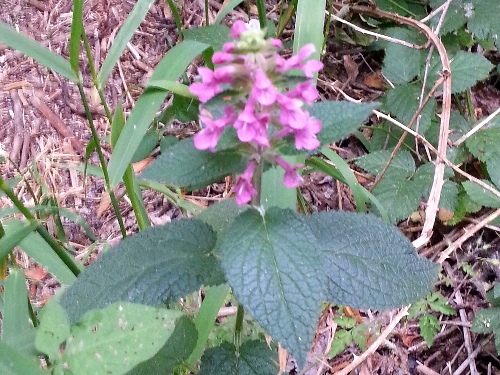 Cooley's Hedge Nettle, Stachys cooleyae. Bad photo by Michael Hobbs |
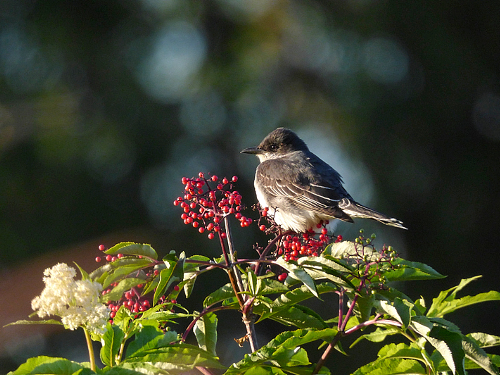 Eastern Kingbird, 2015-06-13. Photo by Vickie Scales |
Report for June 19, 2014 Birding at Marymoor
| We had a really nice day this morning at Marymoor. Sunrise was startlingly beautiful, due to a thin and rumpled layer of clouds, which slowly cleared throughout the morning. The clouds kept catching our eyes, which was a good thing, as there were many birds overhead that we might have missed otherwise. Chief among these were at least SEVENTEEN CASPIAN TERNS, all flying north, in groups of 1-6 birds at a time.
Highlights: Wood Duck Several clutches of ducklings Lots of babies, including a SONG SPARROW feeding a young BROWN-HEADED COWBIRD :( [We had at least 2 juvenile BHCOs today]. We found a BUSHTIT nest near the east end of the boardwalk, and a WESTERN WOOD-PEWEE nest just south of the Dog Meadow. We had 61 species for the day (after Sharon found PURPLE MARTINS by driving over to scan the NE corner of the lake). Black Swifts were new for the year for our walk; our 2014 list is at 139, I believe. == Michael Hobbs |
|
|
|
|
|
|
|
|
|
|
|
|
|
|
|
|
|
|
|
|
|
|
|
|
|
|
|
|
Report for June 20, 2013 Birding at Marymoor
|
Today's best find was Michael Hobbs, returned from a trip to Ecuador - he hadn't been back many hours, though, so I'm still pinch-hitting with the report. Today was a bit of a slow day with a couple good finds mixed in -- our numbers, both people and birds, were down -- WOS Conference & rain both aided with that. The rain was never driving, but it only let up for short bursts -- the birds mostly stayed hidden, and a lot of our 'sightings' were heard-only birds. Notable sightings: Great Blue Heron - still many young at nests in the cottonwoods - I counted at least 9 still up there, including one nest with either 3 or 4 crowded together and squabbling over space. Hammond's Flycatcher - as with last week, there was one singing over at the Rowing Club Red-eyed Vireo - heard one today near east end of the forest Orange-crowned Warbler - 1 singing again , not normally a breeding season bird at Marymoor, though not unprecedented. Black-throated Gray Warbler - one male at the Rowing Club - If I read the records correctly, this is the first June sighting for Marymoor! We get them in the spring, until ~the 3rd week in May, we get them in the fall beginning in August, and we've had them twice in mid-July. But never before in June. Not a rare bird elsewhere, but rare here at Marymoor in breeding season. Misses for the day: We missed a lot -- the rain had us moving quicker than usual, no doubt -- Misses included: Canada Goose!, Barn Swallow, Bullock's Oriole [on nest maybe?], & Purple Finch. For the day, 53 species. Good birding, Matt Bartels |
|
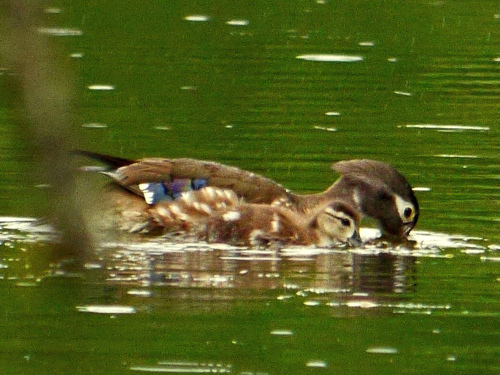 Like mother, like daughter: Wood Ducks. Photo by Ollie Oliver |
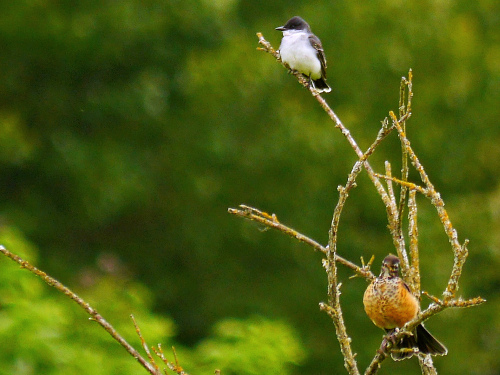 Eastern Kingbird with juvenile American Robin, 2013-06-19. Photo by Ollie Oliver |
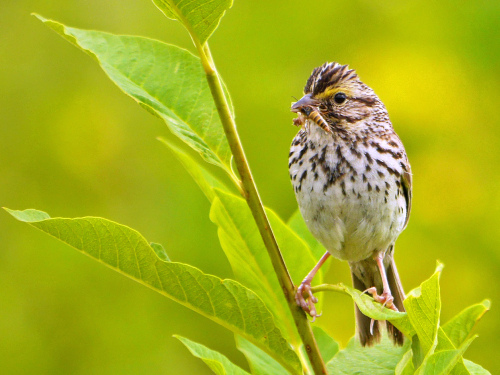 Savannah Sparrow, 2013-06-19. Photo by Ollie Oliver |
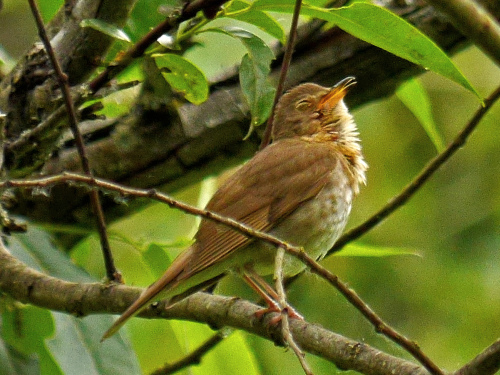 Swainson's Thrush, 2013-06-19. Photo by Ollie Oliver |
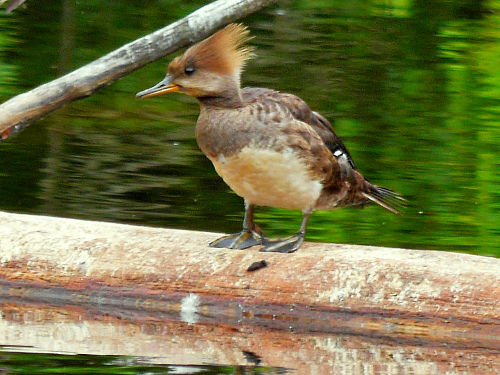 Young Hooded Merganser, 2013-06-19. Photo by Ollie Oliver |
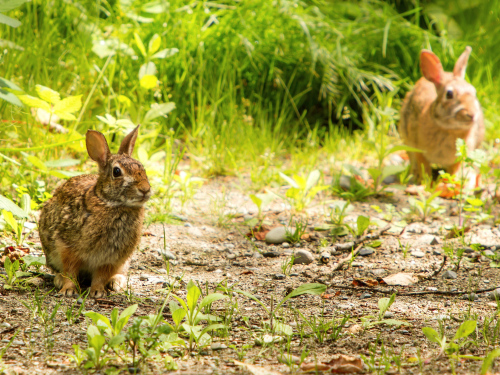 Eastern Cottontails, 2013-06-18. Photo by Dasha Gudalewicz |
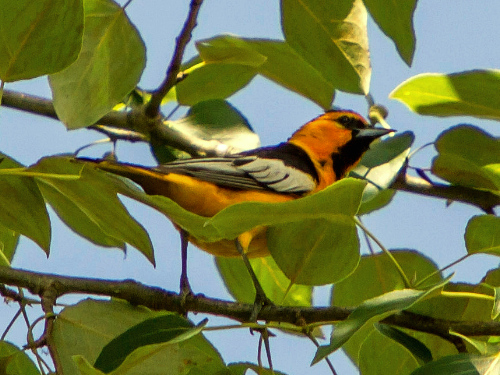 Male Bullock's Oriole, 2013-06-18. Photo by Dasha Gudalewicz |
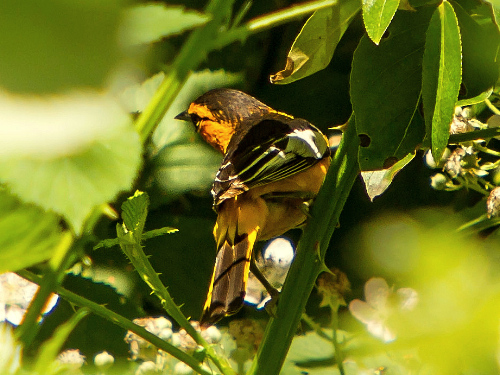 Male Bullock's Oriole, 2013-06-18. Photo by Dasha Gudalewicz |
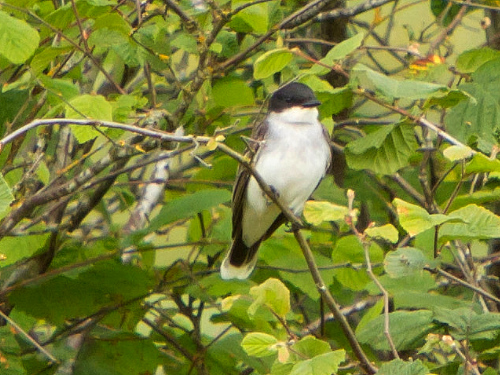 Eastern Kingbird, 2013-06-17. Photo by Dasha Gudalewicz |
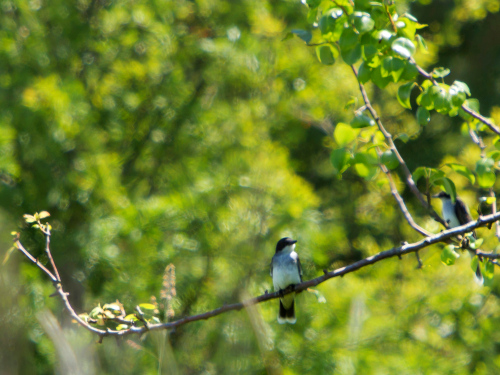 Two Eastern Kingbirds, 2013-06-17. Photo by Dasha Gudalewicz |
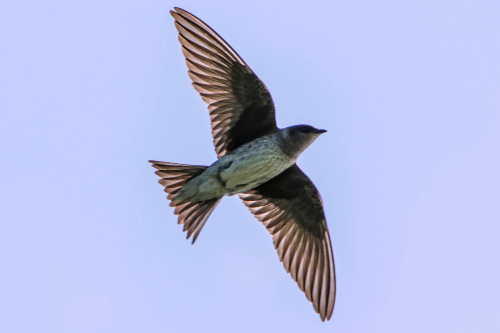 Female Purple Martin, 2013-06-17. Photo by Dasha Gudalewicz |
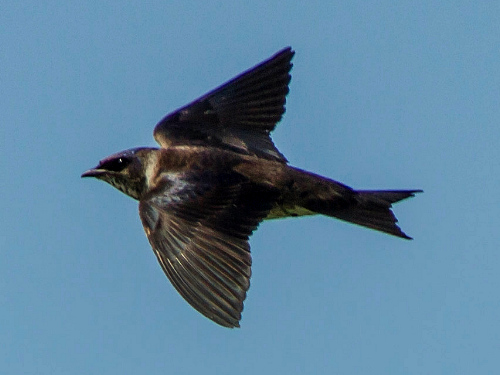 Female Purple Martin, 2013-06-17. Photo by Dasha Gudalewicz |
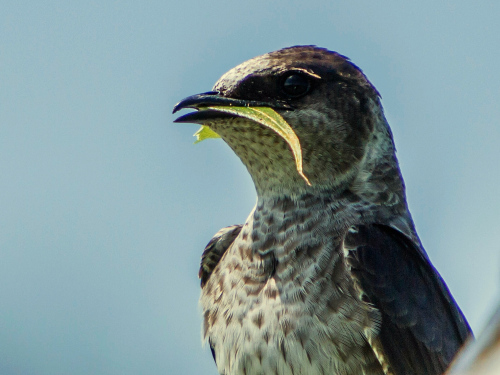 Female Purple Martin, 2013-06-17. Photo by Dasha Gudalewicz |
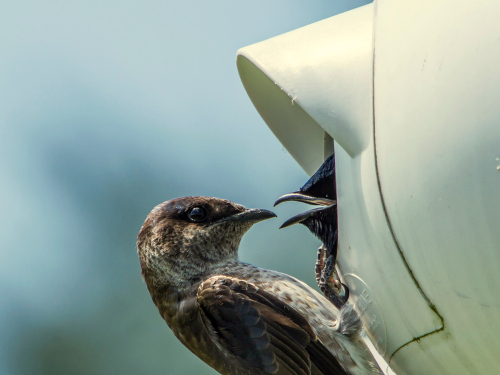 Purple Martins, 2013-06-17. Photo by Dasha Gudalewicz |
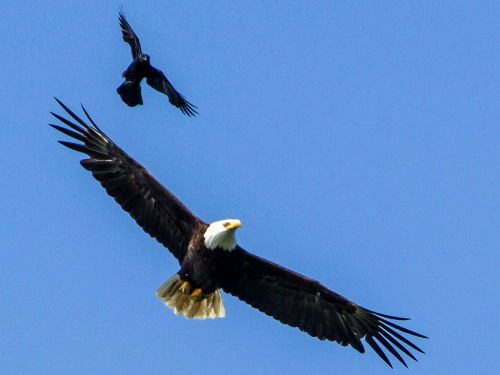 Bald Eagle mobbed by an American Crow, 2013-06-17. Photo by Dasha Gudalewicz |
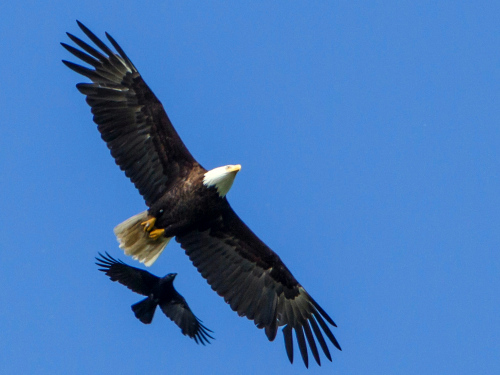 Bald Eagle mobbed by an American Crow, 2013-06-17. Photo by Dasha Gudalewicz |
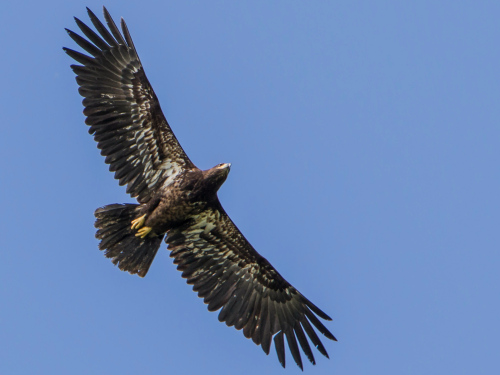 Juvenile Bald Eagle, 2013-06-17. Photo by Dasha Gudalewicz |
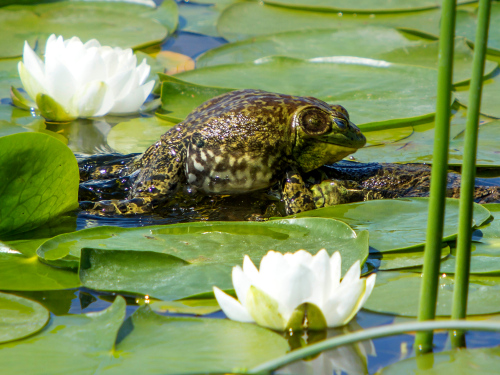 Bullfrogs, 2013-06-17. Photo by Dasha Gudalewicz |
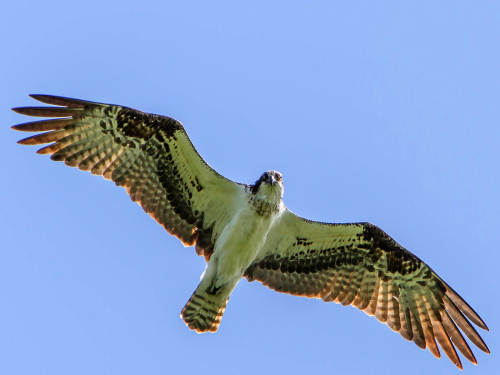 Osprey, 2013-06-17. Photo by Dasha Gudalewicz |
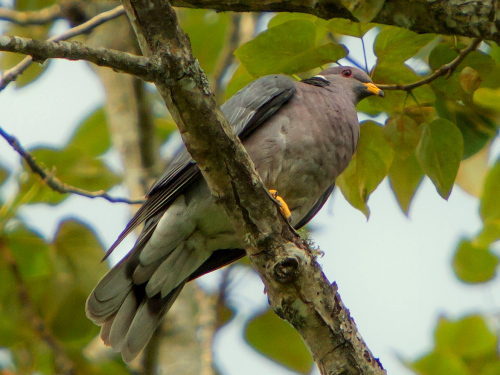 Band-tailed Pigeon, 2013-06-17. Photo by Dasha Gudalewicz |
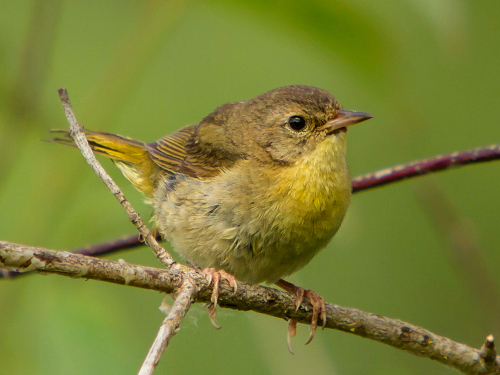 Juvenile Common Yellowthroat, 2013-06-17. Photo by Dasha Gudalewicz |
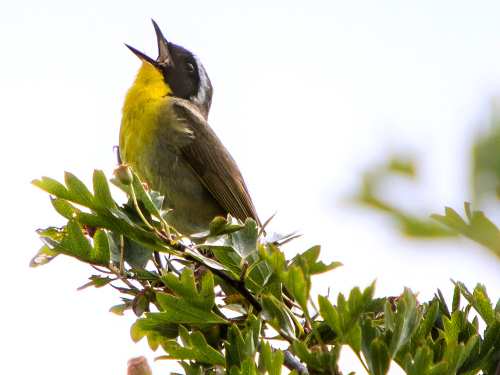 Male Common Yellowthroat, 2013-06-17. Photo by Dasha Gudalewicz |
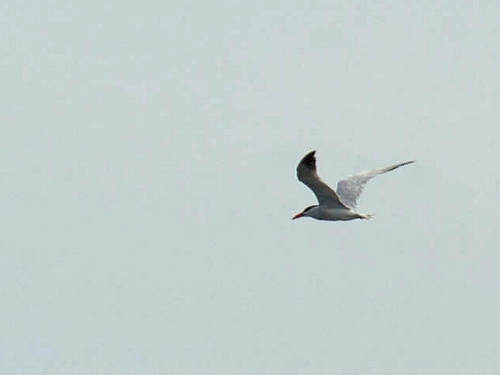 Caspian Tern, 2013-06-15. Photo by Tony Ernst. |
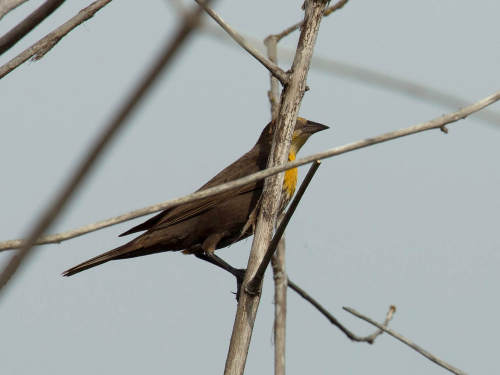 Female Yellow-headed Blackbird, 2013-06-15. Photo by Tony Ernst. |
Report for June 21, 2012 Birding at Marymoor
|
A very nice Summer Solstice at Marymoor today featured a few surprises. Temps were middling (48-66 degrees), sunny to light overcast, no wind, a little fog early. Lots of nesting activity and young to confuse us. |
|
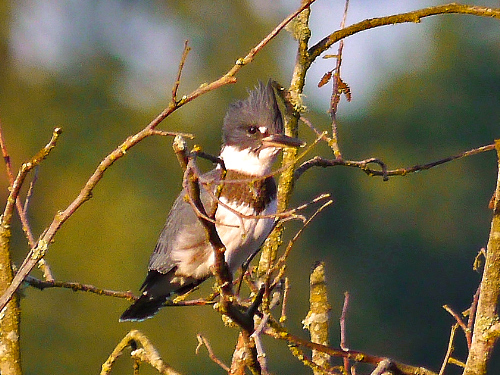 Belted Kingfisher. Photo by Ollie Oliver |
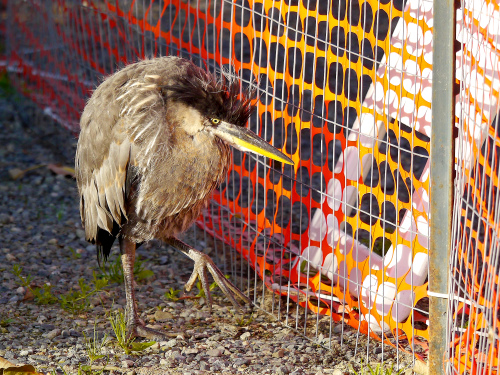 Juvenile Great Blue Heron that fell out of a nest. Photo by Ollie Oliver |
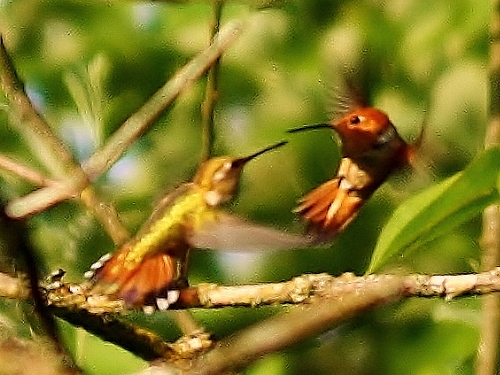 Rufous Hummingbirds. Photo by Lillian Reis. |
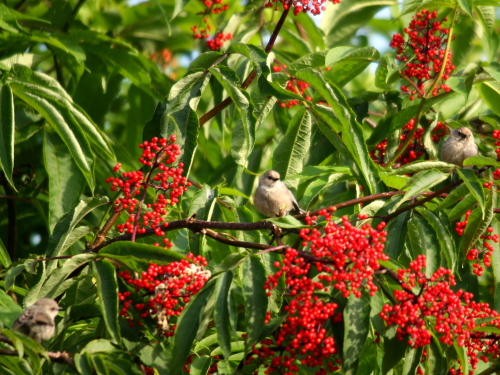 Bushtits in a Red Elderberry. Photo by Lillian Reis |
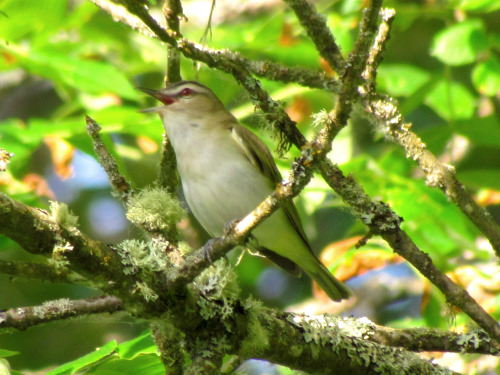 Singing Red-eyed Vireo. Photo by Scott Ramos |
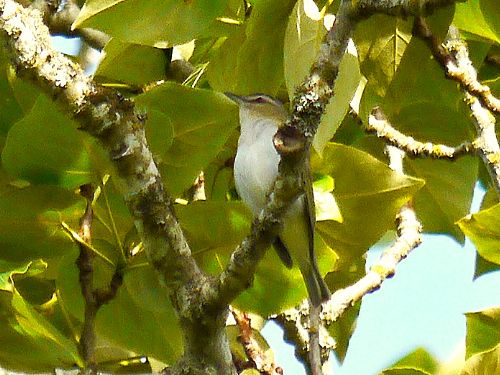 Red-eyed Vireo. Photo by Ollie Oliver |
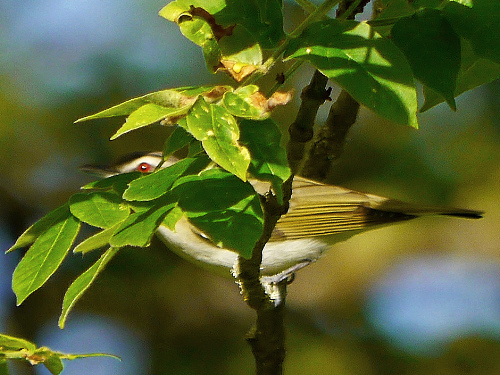 Red eye of the Red-eyed Vireo. Photo by Ollie Oliver |
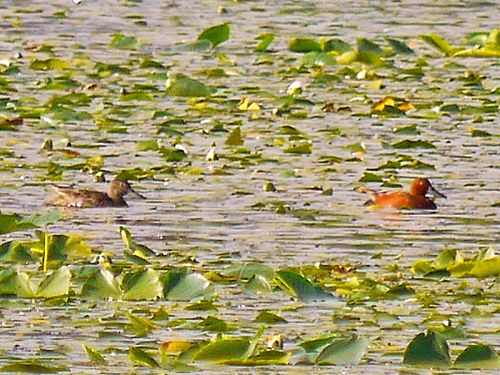 Cinnamon Teal pair at the lake. Photo by Ollie Oliver |
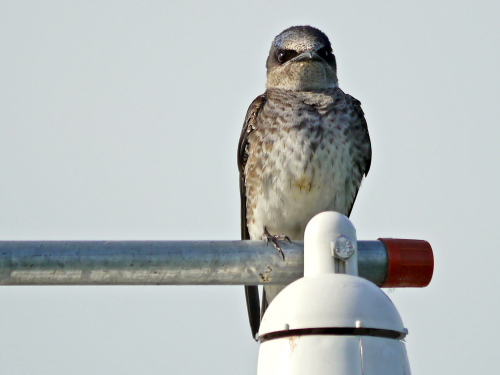 Female Purple Martin. Photo by Ollie Oliver |
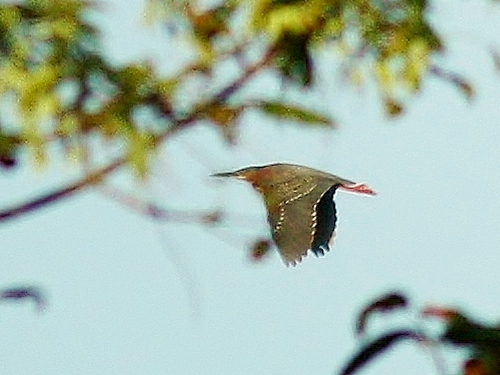 Green Heron. Photo by Lillian Reis |
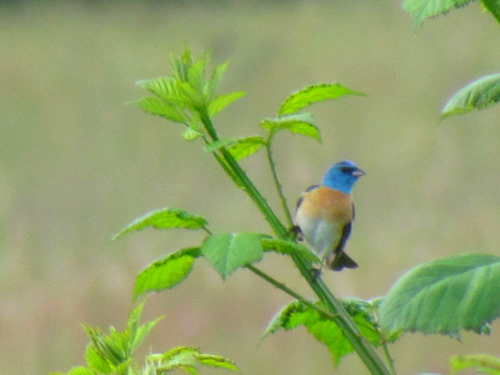 Male Lazuli Bunting near the Compost Piles. Photo by Scott Ramos |
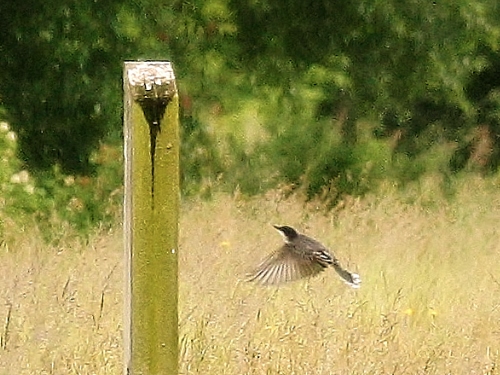 Eastern Kingbird, East Meadow, 2012-06-16. Photo by Lillian Reis |
Report for June 23, 2011 Birding at Marymoor
|
It was cold, drizzly, rainy, dark, and fairly quiet at Marymoor. At this time of year, the chance of surprises is fairly low, and sure enough we didn't get anything really surprising. |
|
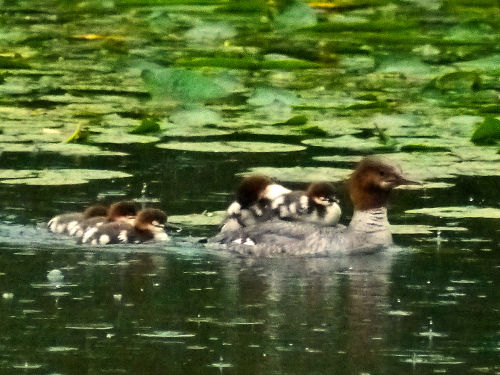 Babies aboard female Common Merganser. Photo by Ollie Oliver |
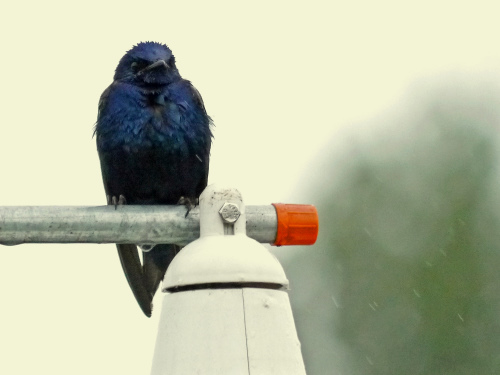 Male Purple Martin in the rain. Photo by Ollie Oliver |
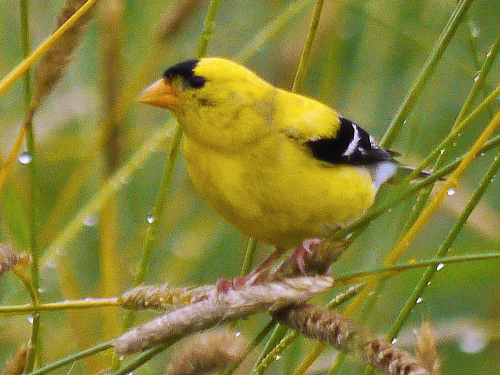 Male American Goldfinch. Photo by Ollie Oliver |
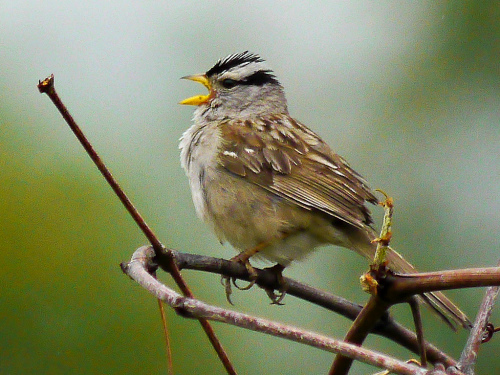 Singing White-crowned Sparrow. Photo by Ollie Oliver |
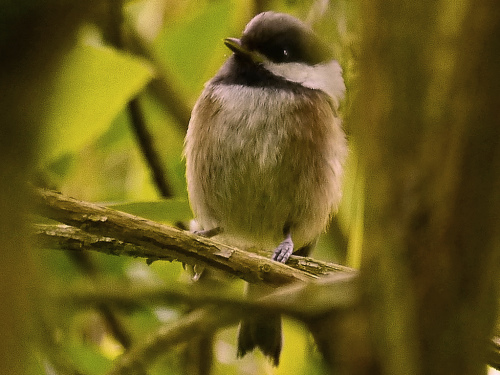 Chestnut-backed Chickadee. Photo by Ollie Oliver |
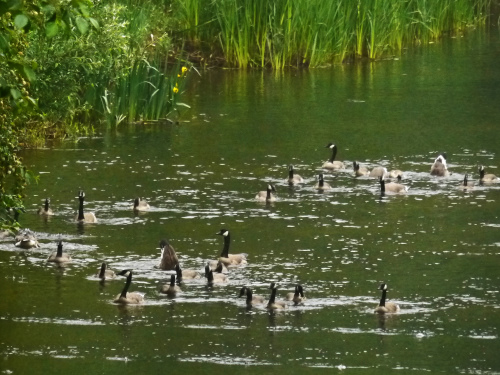 Canada Geese massing in the slough. Photo by Ollie Oliver |
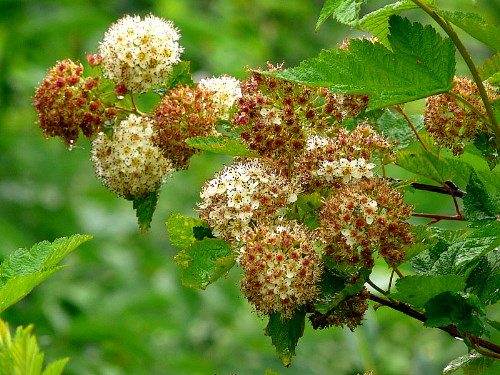 Pacific Ninebark blossoms. Photo by Hugh Jennings |
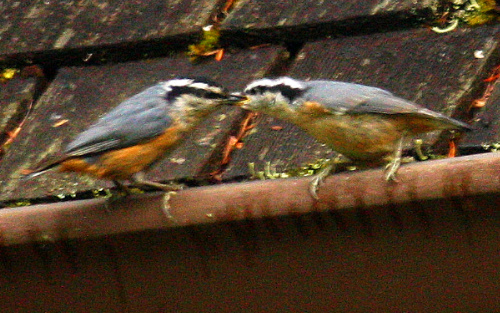 Nuthatch feeding its young at the park office. Photo by Lillian Reis, 2011-06-19 |
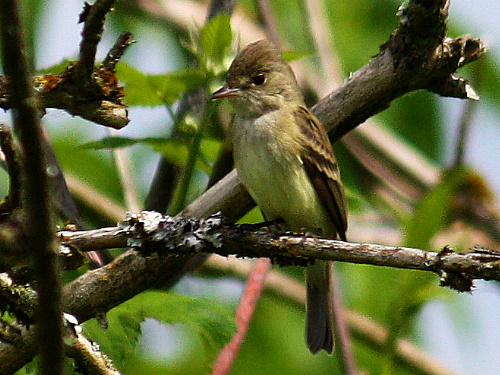 Willow Flycatcher, 2011-06-17. Photo by Lillian Reis |
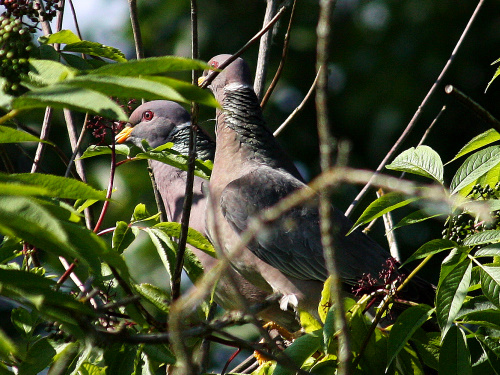 Band-tailed Pigeons, 2011-06-17. Photo by Lillian Reis |
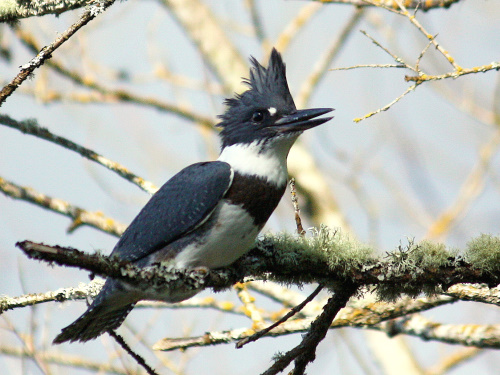 Male Belted Kingfisher, 2011-06-17. Photo by Lillian Reis |
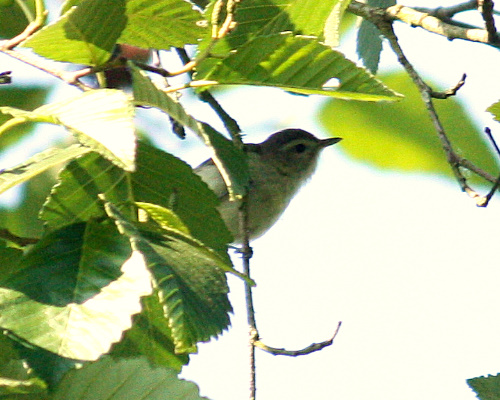 Warbling Vireo, 2011-06-17. Photo by Lillian Reis |
Report for June 24, 2010
|
Finally a summery day! Still a cool 50 degrees to start, but by 10:30, it approached 70. And there was sun. Fairly birdy too. |
|
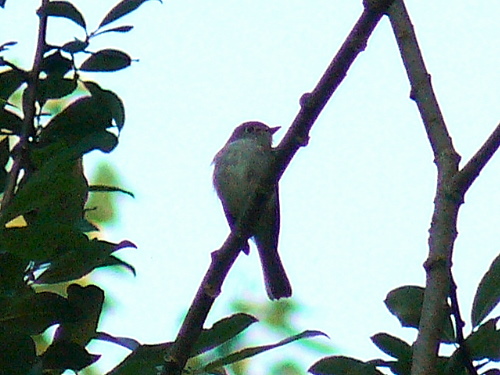 Least Flycatcher. Photo by Ollie Oliver |
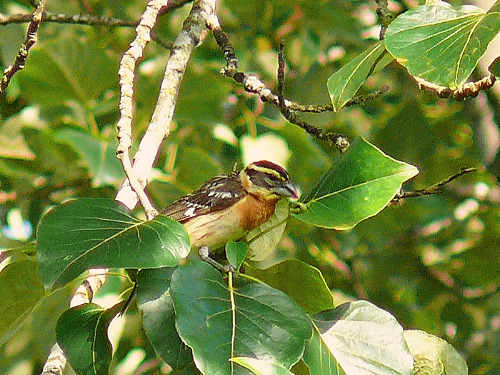 Female Black-headed Grosbeak. Photo by Ollie Oliver |
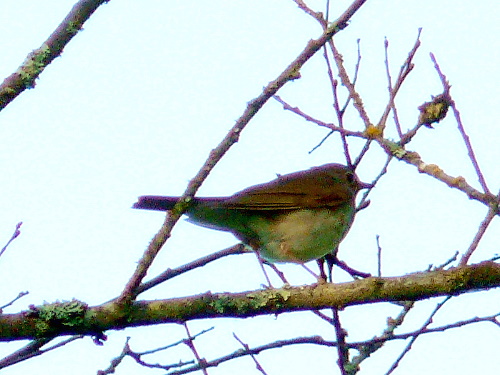 Swainson's Thrush |
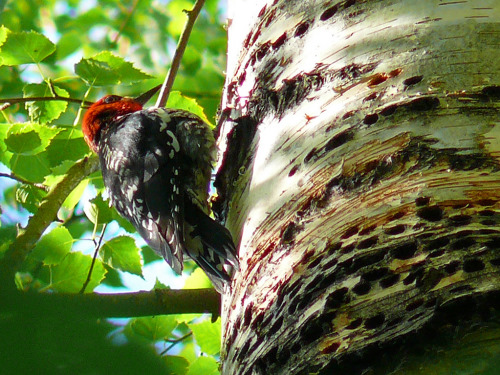 Red-breasted Sapsucker. Photo by Ollie Oliver |
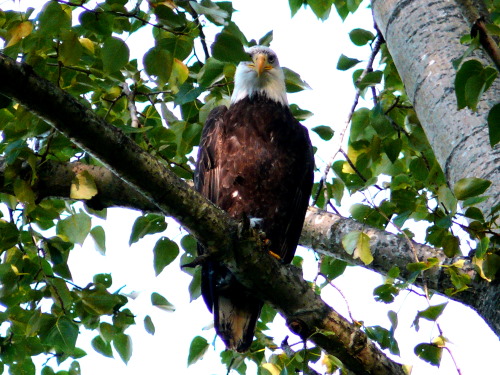 Bald Eagle adult in Big Cottonwood Forest... |
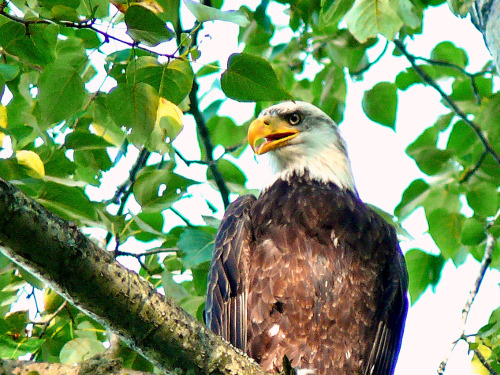 ...Ollie had a closer angle |
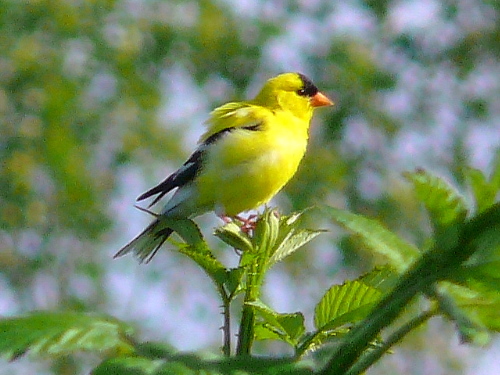 American Goldfinch male |
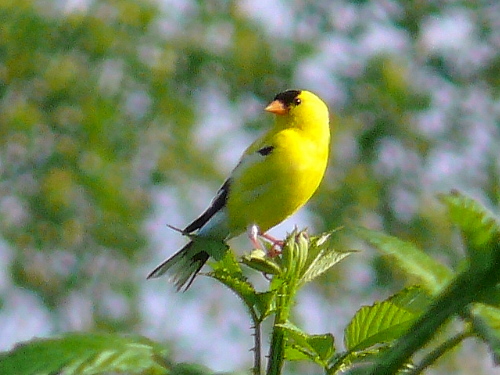 Same guy looking a bit less ruffled |
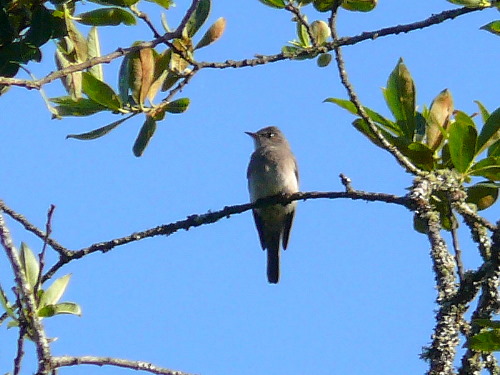 Western Wood-Pewee |
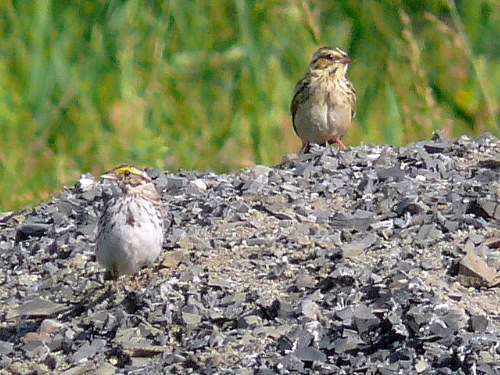 Savannah Sparrows. I believe the one on the right is a juvenile |
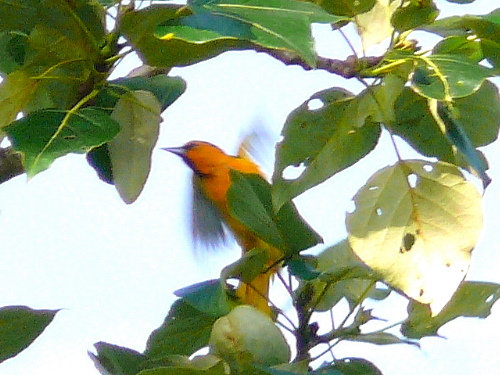 Male Bullock's Oriole in Snag Row |
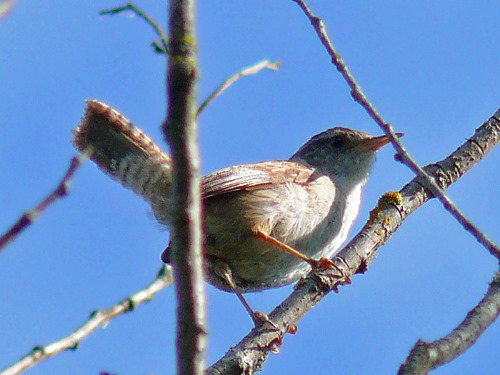 Marsh Wren. Photo by Ollie Oliver |
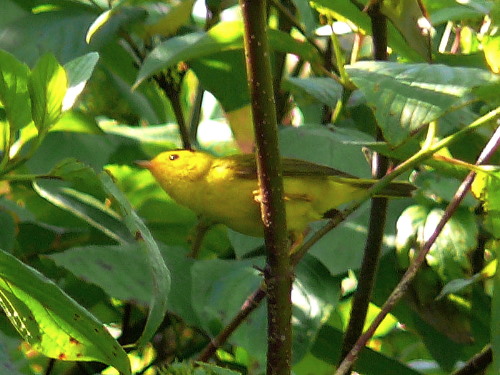 Male Wilson's Warbler near windmill |
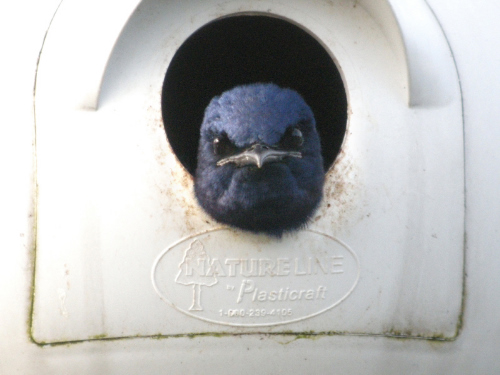 Male Purple Martin in a nest gourd, 2010-06-18. Photo by Bill Byers |
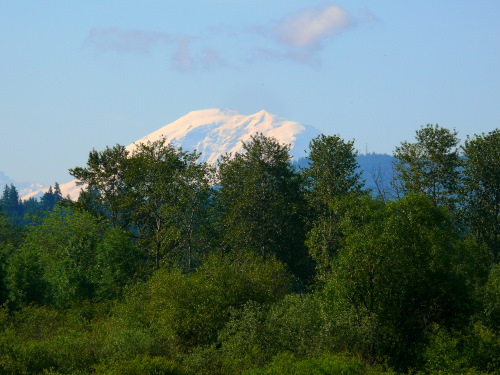 Mt. Rainier looking good |
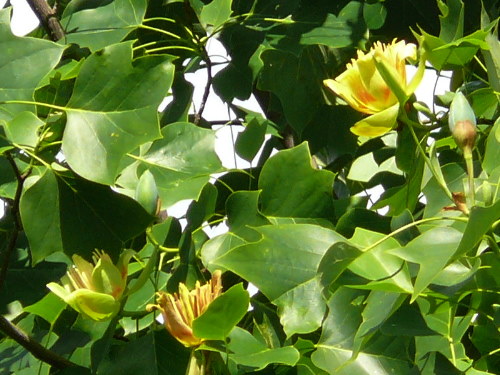 The (non-native) Tulip Poplars are in bloom near the mansion |
Report for June 18, 2009
|
A surprisingly interesting day at Marymoor this morning. About 15 of us wandered around on a morning with heavy, dead air, under mostly overcast skies. Thankfully, there wasn't a lot of heat to go with the humidity, and by about 8:00 a touch of breeze came up. That kept the mosquito problem down to uncomfortable. We kind of expect June to be a fairly static month, yet we had 10 species this week that we didn't have last week. Highlights: Sharp-shinned Hawk Grace & Ollie reported 1 in the Pea Patch An OSPREY was seen atop the Odd Snag which has hosted nesting RED-AILED HAWKS for years. The hawk nest failed this year (report of a Bald Eagle raid). Sharon saw a Red-tail atop the snag moments after the Osprey had been seen, so the hawks may be maintaining ownership of the nest. The GREEN HERON nest at the Rowing Club was empty, but one mostly-feathered young bird was a few feet away. Presumably the others had managed to fly to other parts of the pond edges. Many adults were sighted today. This week (#25) is the week with the most CASPIAN TERN sightings at Marymoor. Terns have been seen on 13 weeks, spanning May-July plus 1 April and 1 August sighting. We've seen terns on 35 total days, and 7 of those have been on week #25. So this week appears to be the peak of their summer wandering. Once again, Scott heard a WESTERN SCREECH-OWL southwest of the windmill area somewhere in the early morning. The EVENING GROSBEAK is our first sighting of that species in "summer" (June/July). For the day, 61 species. == Michael |
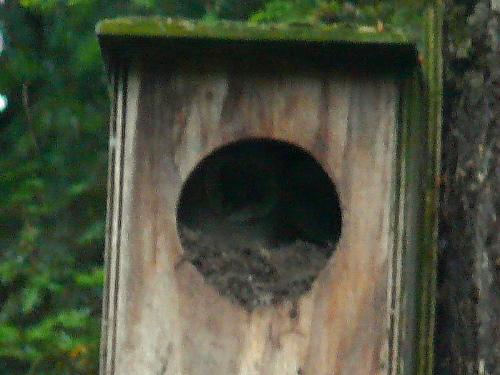 A baby Barn Owl on the left, with a hint of the face of the adult, right 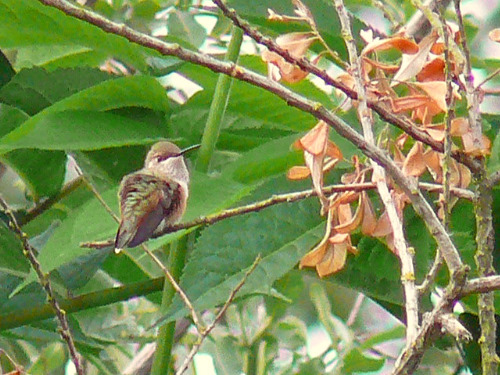 Rufous Hummingbird |
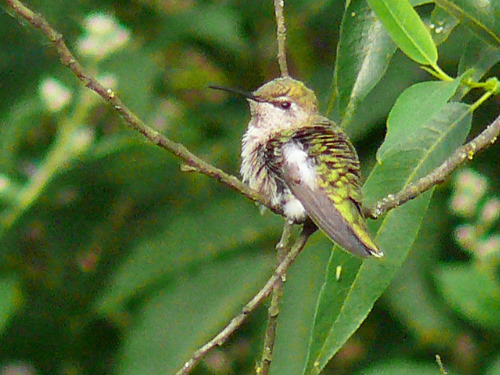 Anna's Hummingbird, photo by Ollie Oliver |
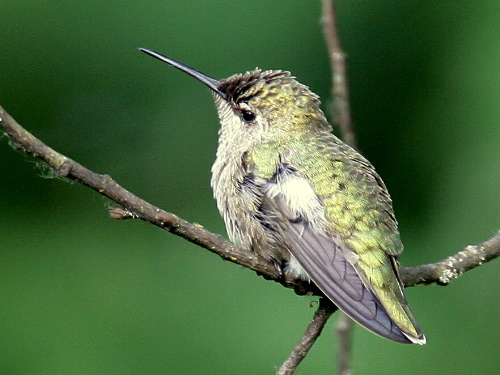 Anna's Hummingbird, photo by Yoshi Nishimura |
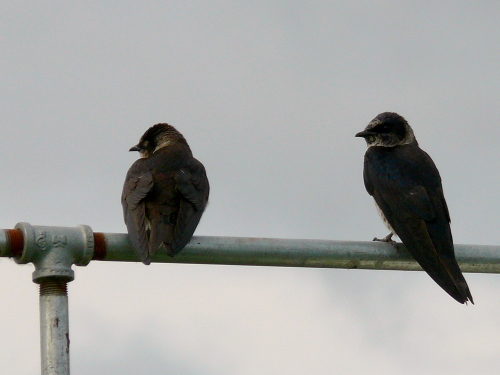 Female Purple Martins |
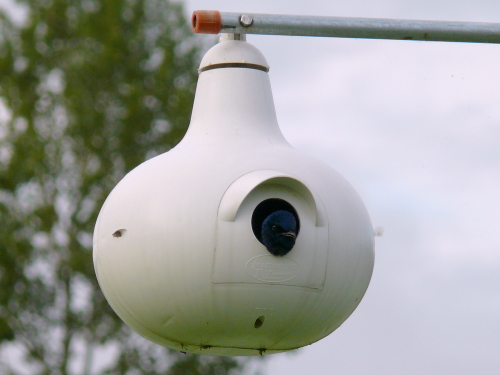 Male Purple Martin in near, left gourd |
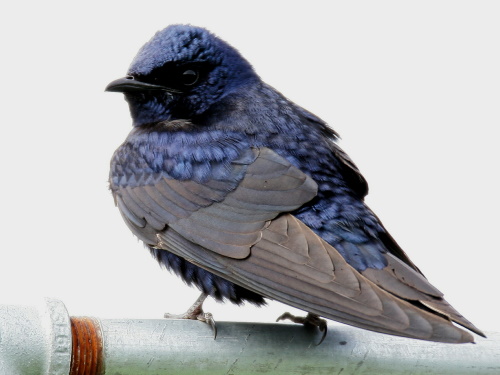 Male Purple Martin, photo by Yoshi Nishimura |
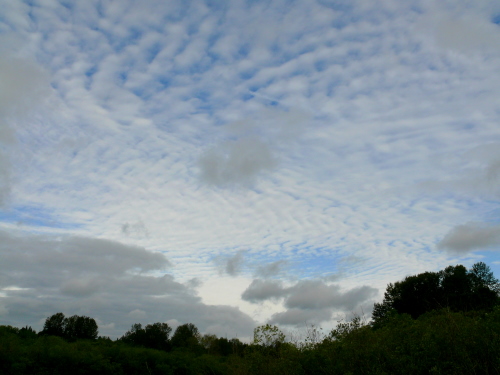 The amazing sky over the lake platform |
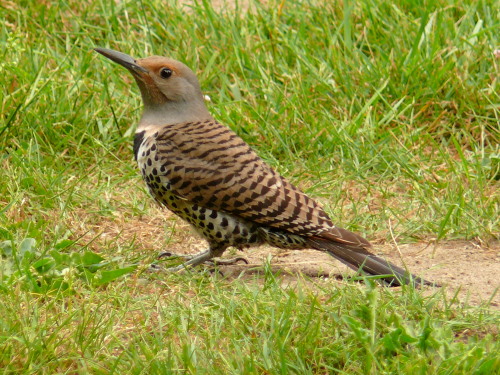 Nothern Flicker |
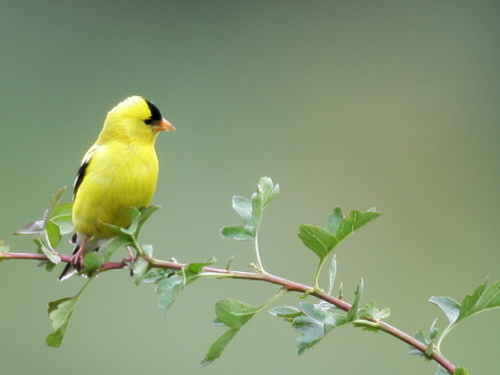 Male American Goldfinch, photo by Yoshi Nishimura |
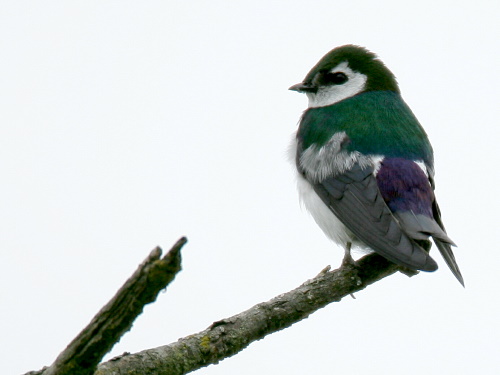 Violet-green Swallow, photo by Yoshi Nishimura |
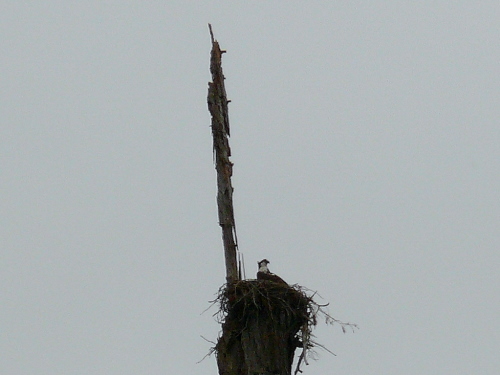 Osprey atop Red-tailed Hawk nest on odd-snag west of the park |
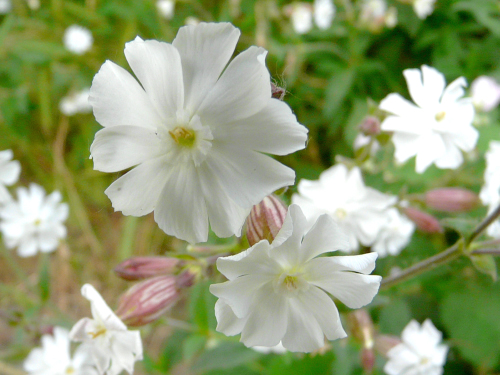 |
White Campion flowers, photo by Hugh Jennings |
Report for June 19, 2008
|
The morning started out as a typical Junuary day - cool, overcast, a bit of drizzle, but it later warmed up to almost warm and summery. I ended up almost wishing I'd taken off my sweatshirt, but not quite. The mosquitoes weren't as bad as last week.
|
|
|
|
|
|
|
Ollie Oliver's photo of a Savannah Sparrow |
Report for June 21, 2007
|
I think there were about 17 people today, although there was too much coming and going for me to keep everyone straight. Weather on this Summer Solstice day was unique among all of my trips to Marymoor. Skies were mostly overcast, with occasional sun breaks. What was odd were the numerous drizzle-squalls. Every once in a while the wind would suddenly pick up and we be hit by a wall of drizzle (maybe even just mist). Hardly enough to even get you wet, but blowing horizontally. After a couple of minutes, the precipitation and the wind would die down. Most bizarre. This late June period is characterized by the presence of our breeding birds, with just a hint of post-breeding dispersal beginning. Today we had our first WHITE-CROWNED SPARROW after six weeks without. The Pea Patch featured a couple of sightings of an immature bird, still retaining juvenal plumage. For whatever reason, WCSP seem to prefer to breed in the parking lots at Microsoft (and other similar places) over the verdant green of Marymoor; we usually have only distant heard-only WCSP during the peak of breeding season. The rest of the year, though, they like Marymoor just fine. Today marked the first sign of their return. We also had two CASPIAN TERNS, perhaps failed breeders already ranging. This is by far the most common week of the year for Caspian Tern sightings at Marymoor (our 6th sighting for week 25, over the last 13 years). No other week of the year has more than three sightings. Most of our CATE sightings have been from late May through early July, with one April and one August sighting. Other highlights: Bald Eagle 13 birds; perhaps 5 adults among them, over/near the lake For the day, 56 species, including some California Quail reported by Brendan and Jonathan Higgins as they left the east end of the park. == Michael |
|
|
|
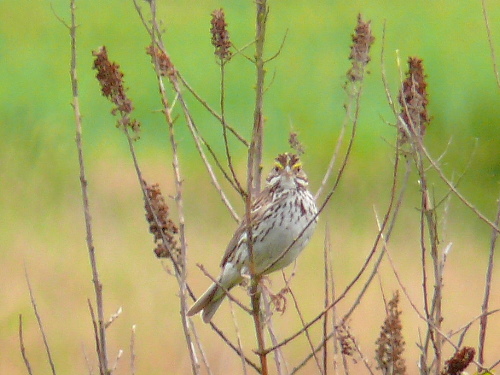 Savannah Sparrow |
|
|
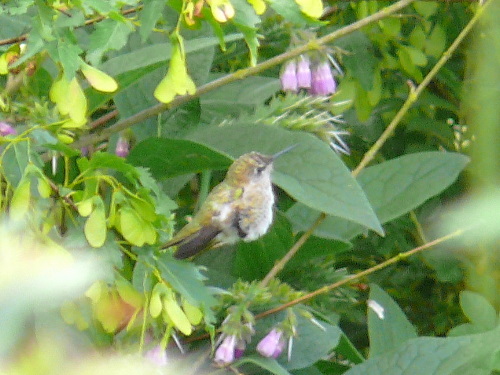 Anna's Hummingbird |
|
|
Juvenile Dark-eyed Junco |
Prev |
Bird Sightings Week 25
|
Next |




